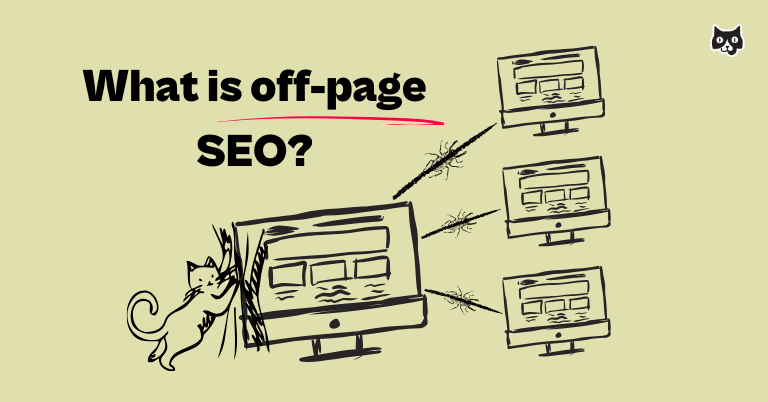Imagine you’re hungry and want recommendations for a good restaurant. There’s one restaurant that one of your close friends is recommending in his area, who happens to be a big foodie. And another restaurant which a random guy on the street is recommending to you.
Which restaurant would you pick to eat out at and why? Let me guess, the first one. And the reasons behind your choice would be:
- It came from a person you knew and already had a relationship with.
- The friend has a passion for food so their recommendation was credible.
- Your friend knows that area well while you have no idea about the other person.
See that’s exactly how search engines work when evaluating the off-page SEO signals to determine if a page inside the search engine results pages (SERP) deserves higher rankings or not. These signals essentially tell search engines that a particular website is trustable and holds authority for a specific subject matter.
In this article, we’re going to unfold off-page SEO from a fundamental level, break down the science involved in link-building and see some real-life case studies of companies that leveraged link building to achieve incredible organic results.
As pure-bred SEOs at Flying Cat Marketing, we work on many SEO projects in our day-to-day. Analyzing new SEO trends we have not only developed a deep understanding of how off-page SEO impacts rankings and how search engines perceive it but also how SEOs can maximize the outcomes from off-page SEO practices that translate to not only higher rankings but many additional benefits for your website.
We created a guide to interviewing customers for content that resonates with them
CREATE CONTENT FOR GROWTH
What is off-page SEO?
Off-page SEO is a combination of actions taken outside of your website in order to achieve higher organic search rankings. While optimizing your website with off-page SEO includes building authority and trustworthiness of your website in the eyes of a search engine primarily, it also helps with developing confidence and reliance from a user’s perspective.
For a website to perform well, it needs to be optimized for both on-page and off-page ranking factors. On-page factors would mainly build relevancy around specific topics and show the technical strength of the website while off-page factors will make search engines like Google perceive your website as a credible source of information on the web.
With the right mix of relevance (on-page SEO) and authority (off-page SEO), your rankings can shoot to the moon.
Why do you need off-page SEO?
Off-page SEO is conceivably the strongest factor in achieving great organic search rankings. There’s no reason to debate whether off-page SEO practices work or not; there’s a direct correlation between higher search rankings and off-page signals. There’s a ton of data backing up 100% of our claims here.
Note: Although backlinks are just a component of what off-page SEO is all about, it’s the biggest component. In fact, arguably 90% of off-page SEO is only link-building. So for the sake of argument let’s stick to links to see they correlate with higher rankings.
Research by Backlinko
Brian Dean from Backlinko partnered with Ahrefs to analyze 11.8 million Google search results to conduct a massive SEO factors correlation study. And in the data they found a direct correlation between the top-ranking pages and the number of referring domains (unique domains pointing links to a page):
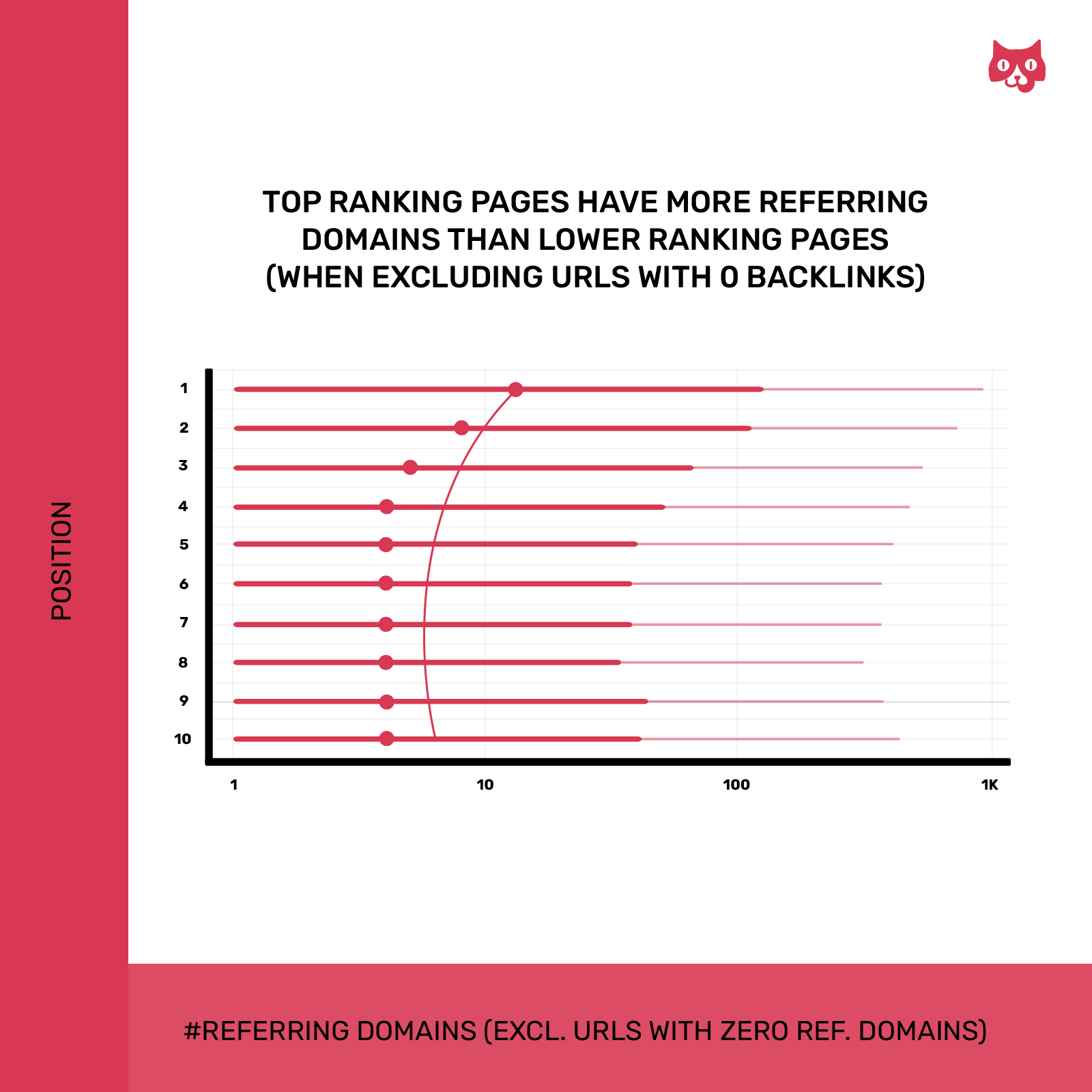
And they also found that on average the #1 ranking result in Google has 3.8x more backlinks than the pages ranking in 2nd or 3rd position.
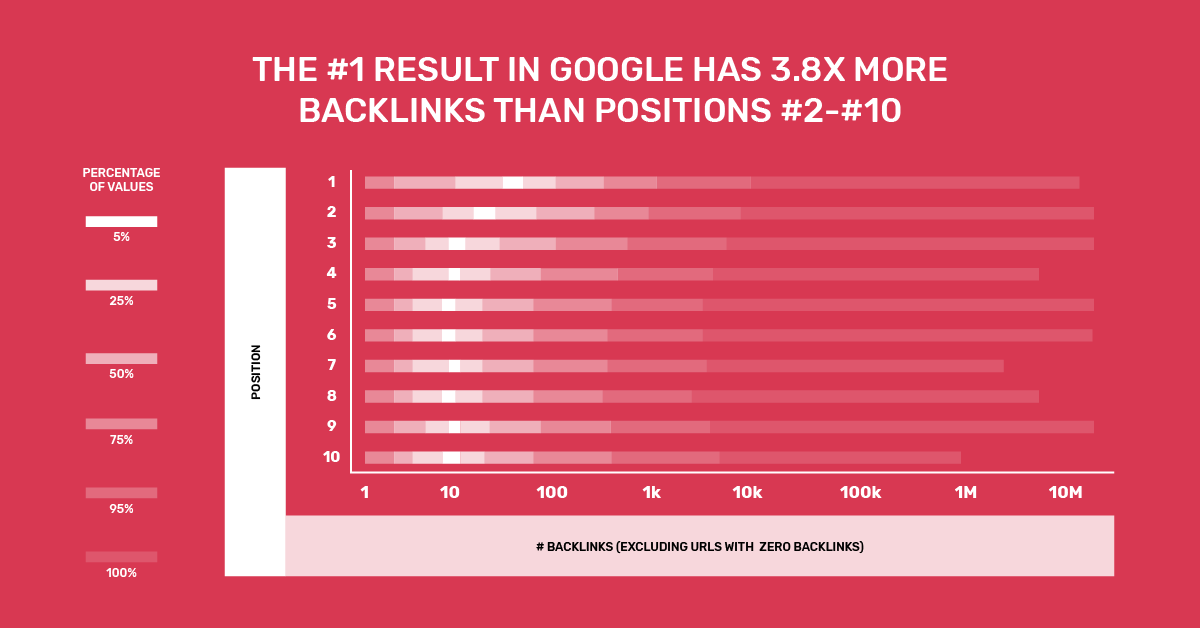
Obviously, no one should blindly rely on data that are based on an average of that many search results, however, the analysis definitely helps develop a correlating relationship between rankings of and links on a page.
Benefits of off-page SEO (not just higher rankings)
We’ve looked at how important off-page SEO can be for higher SERP rankings with a data lens. However, the benefits of it aren’t limited to rankings only.
Here are a few ways off-page SEO, in particular backlinks, enhances your website’s performance.
Develops your website’s authority
When we talk about authority we mean search engines as well as for the user. Having search engines perceive your website as an authority would translate to not only one time higher rankings but permanent strength of your website to consistently perform well.
In practice, it means your website will be better off to rank on competitive terms than a site with fewer backlinks. Although for building this authority, continuous effort is required, the outcome is permanent and forever.
For a user, it means perceiving your website as a trustable source of information that they can turn to for their solutions. For example, a user would trust a website more if it’s being linked to some other credible websites in that particular domain.
Helps your website be more discoverable
An additional benefit of off-page SEO is that it helps with search engine indexing. With off-page SEO you’re building links on different web properties which source back to your website. And if we go back to SEO basics, that’s exactly how crawlers like Googlebot find any website on the internet: following links.
Spiders like Googlebot crawl the entire internet on an infinite loop and links are what they use in order to jump from one page to another while discovering them. Hence, links built to your website or any particular page on your website will help your web pages get indexed faster.
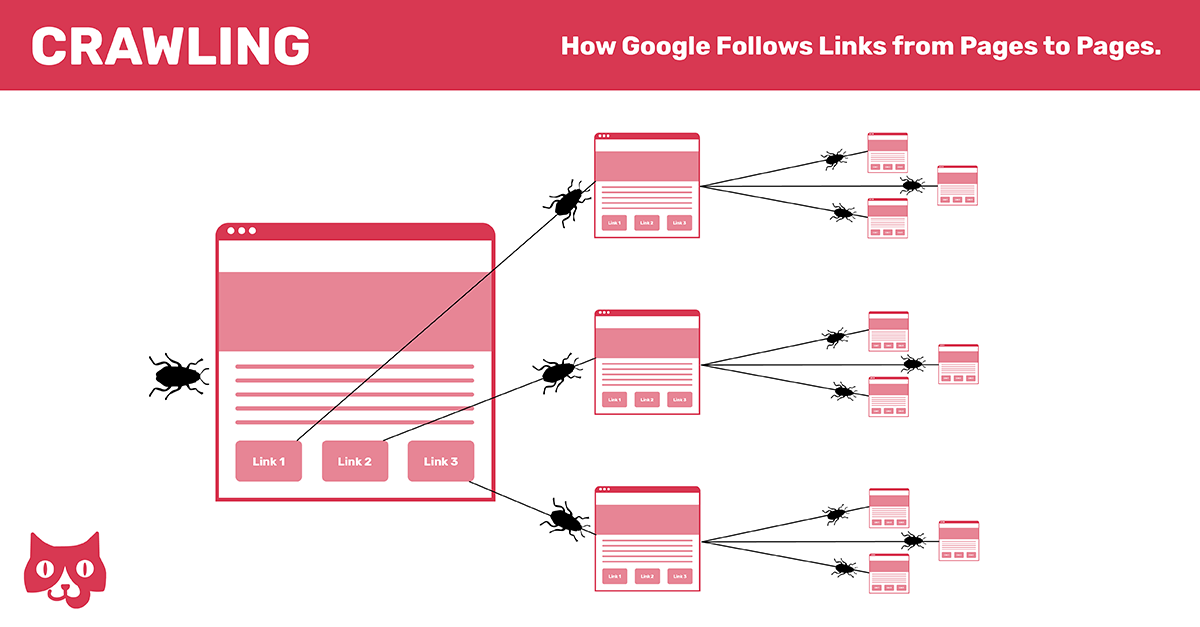
Website/web-page starts ranking for additional keywords
Another benefit of working on your website’s off-page SEO is that the authority it gains helps each page on the website rank for many additional keywords; keywords that you didn’t even optimize for initially.
Google is a semantic search engine that understands the relationship between words being typed. And with a strong backlink profile, search engines like Google are able to expand each page to those adjacent keywords. In turn, this brings a lot of additional traffic to the website helping you achieve your SEO KPIs.
This is a pattern you can easily pick from any query’s SERP. For example, if we type in the keyword “email marketing cost” here’s what we can see from the SERP:
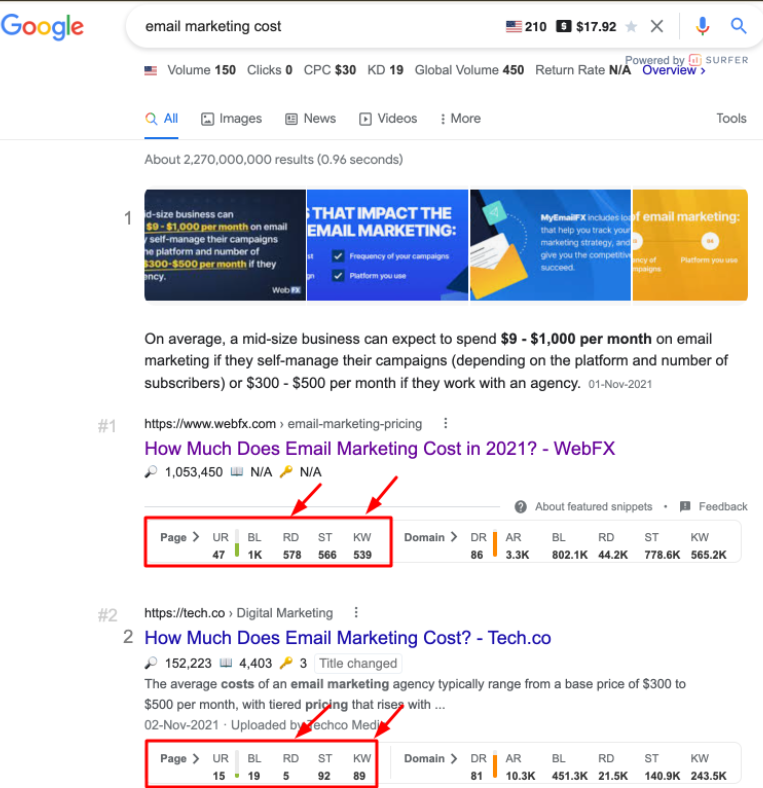
The first webpage has 578 referring domains pointed to each, and its ranking for 500+ keywords and driving in around 560+ search visitors every month. The second page has 5 referring domains pointing to it and its ranking for 80+ keywords and bringing in 90 search visitors a month.
Obviously, the content’s difference between the two pages would be playing a role here too, but in isolation, we can definitely find a correlation between referring domains and traffic per page.
Helps gain referral traffic
As mentioned earlier, off-page SEO has to do with everything that one does outside of their website, such as acquiring links from other websites on the internet or promoting your pages on forums, etc. In both cases, there’s a good probability of your page gaining referral traffic from the linked website.
Although the chances of gaining referral traffic through links placed on 3rd party sites are far lower, still the referring website here would be a variable of success here.
For example, having a link placed in Forbes, written by a popular business author on a topic like Tesla stock would definitely help you gain a lot of referral traffic. However, it might not be the case if the link is placed in a post covered by a local blogger about a generic topic.
Off-page SEO factors: how links are valued?
Although in theory off-page SEO translates to any kind of off-site promotion of your website/brand, still it drills down to link-building 90% of the time. So let’s stick with backlinks whenever we refer to off-page SEO in this section.
With that being established, let us tell you that not all links are valued equally. From a search engine’s perspective, there is a list of factors that are evaluated before assigning a specific weightage to a particular link. Or in simple words how big of an impact can a link have over a website’s/page’s rankings is dependent on the following factors:
1. Popularity of the page
A link coming from a popular page is valued higher than a link coming from an unpopular page. That’s one factor of how a link is valued by Google. However, how do we define the ‘popularity’ of a page in this case? Simple, the popularity of a page is directly proportional to the strength of its backlink profile.
Scenario 1: Page A has a lot of quality backlinks coming to itself and your website receives a link from it.
Scenario 2: Page B has minimal backlinks coming to itself and (with all other factors being constant) your website receives a link from it.
Outcome: The link from page A would be valued a lot more than the link coming from page B. Simply because page A itself has a stronger backlink profile with more quality backlinks which helps it pass stronger link equity to your website compared to page B.
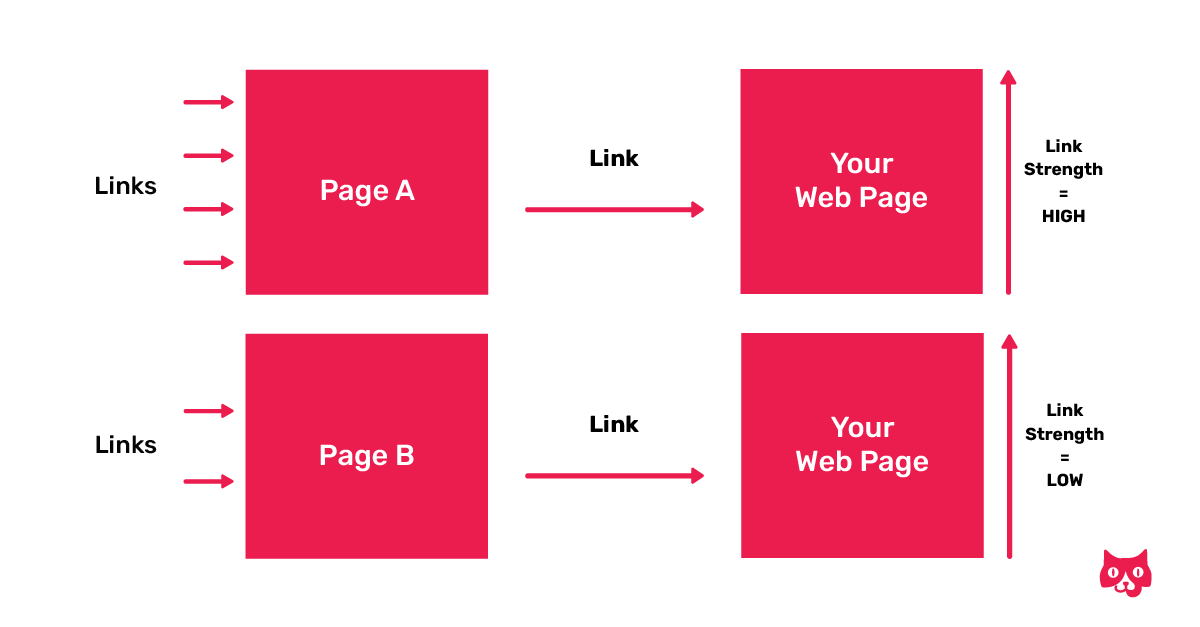
2. Links-click probability
As per a Google algorithm patent they use a technological model called the reasonable surfer model, which basically says that the weightage of a link is assigned based on how likely a user is to click on it.
Some other patents talk about the difference between a link’s spot on a page and one of them is boilerplate that refers to links inside the footer or sidebar of a website being valued less than links inside the content body.
Scenario 1: A page is linked to from a website’s footer.
Scenario 2: A page is linked to from an article’s content in the body.
Outcome: The link would be stronger in the 2nd scenario because the placement of the link in this case makes it more probable to receive a click from a reader/visitor.
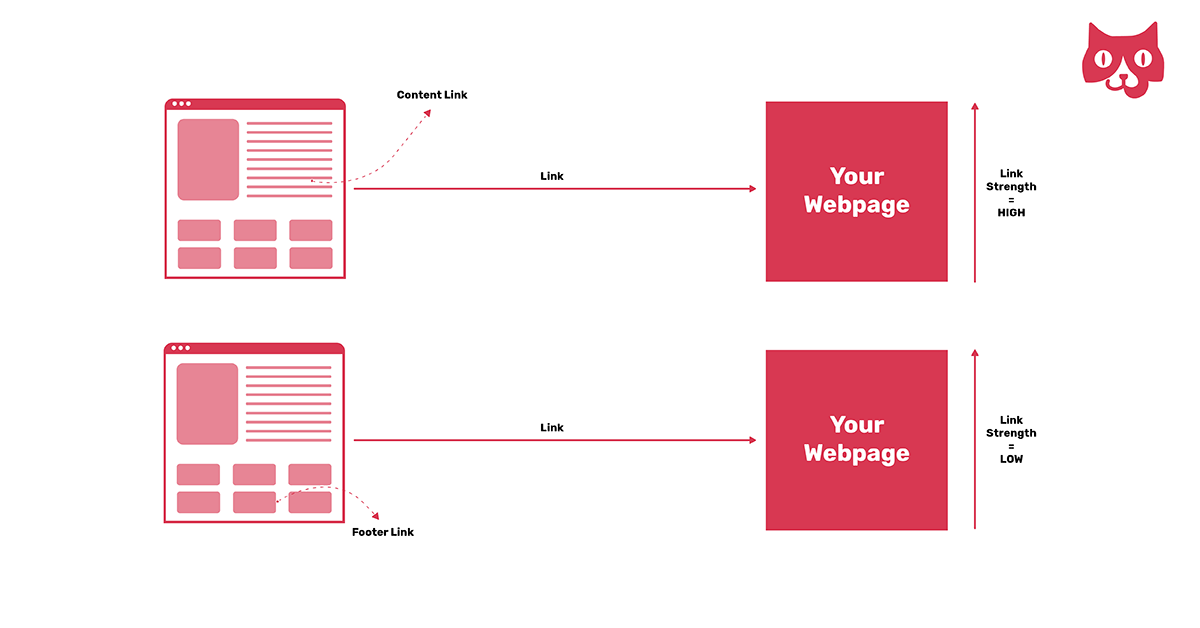
3. Anchor text relevancy
Search professionals from Google have openly accepted various times that anchor texts help their algorithm understand the context behind a link and hence play a crucial role in determining a link’s worth for a search engine.
In fact, the most popular Pagerank patent of Google clearly states that anchor text is a key factor in assigning a specific weightage to a particular backlink. In plain words, in order to understand how relevant a link is for another page, Google tries to decode the words inside the anchor text as well as the words surrounding the anchor text and form a relationship to assign a weightage to the link.
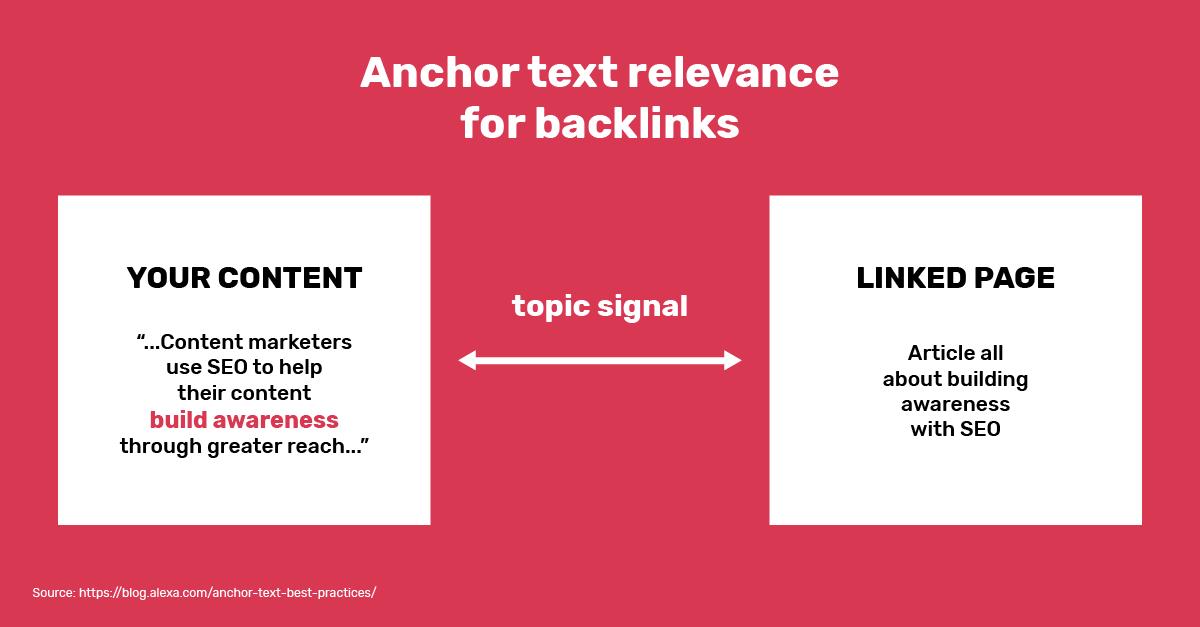
Let’s look at two scenarios and the final outcome to make it crystal clear:
Scenario 1: A page about protein powder is linked from another page with an anchor text “this product” (or anything that generic).
Scenario 2: A page about protein powder is linked from another page with an anchor text “best protein powder” (or anything specific to protein powder).
Outcome: The link would be stronger in the 2nd scenario because the anchor text used is topically relevant to the page being linked.
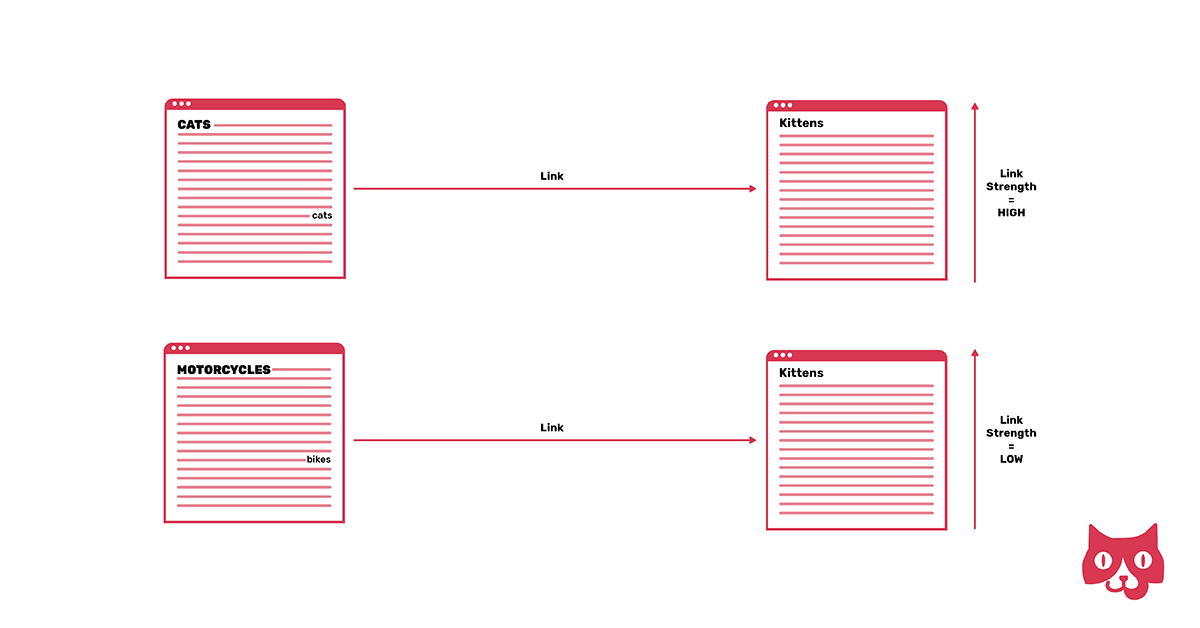
4. Unique domain links
This factor refers to the fact that Google measures the popularity and authoritativeness of a page with respect to the whole web rather than selective pages. So essentially it means that links coming from unique referring domains would be much stronger than links sourced from repeating domains.
A lot of correlation studies around link-building support this narrative. For example, the studies from Ahrefs explicitly showed a relationship between referring domains and higher keyword rankings as well as search traffic;
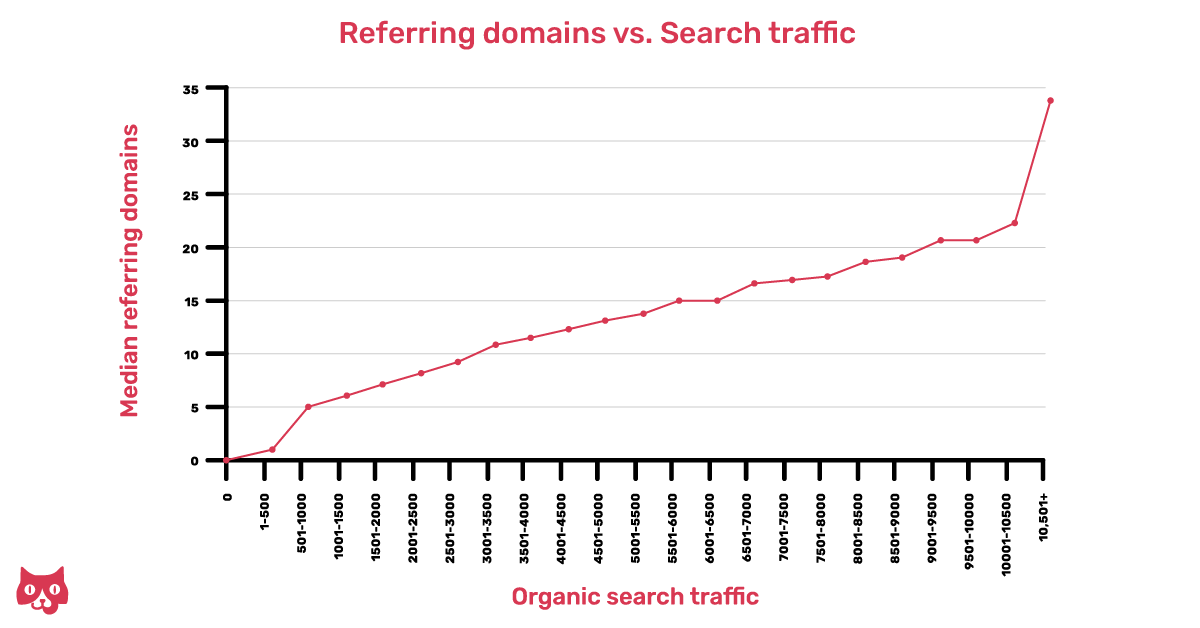
And the same kind of a correlation was found when Ahrefs compared referring domains against ranking keywords for a website;
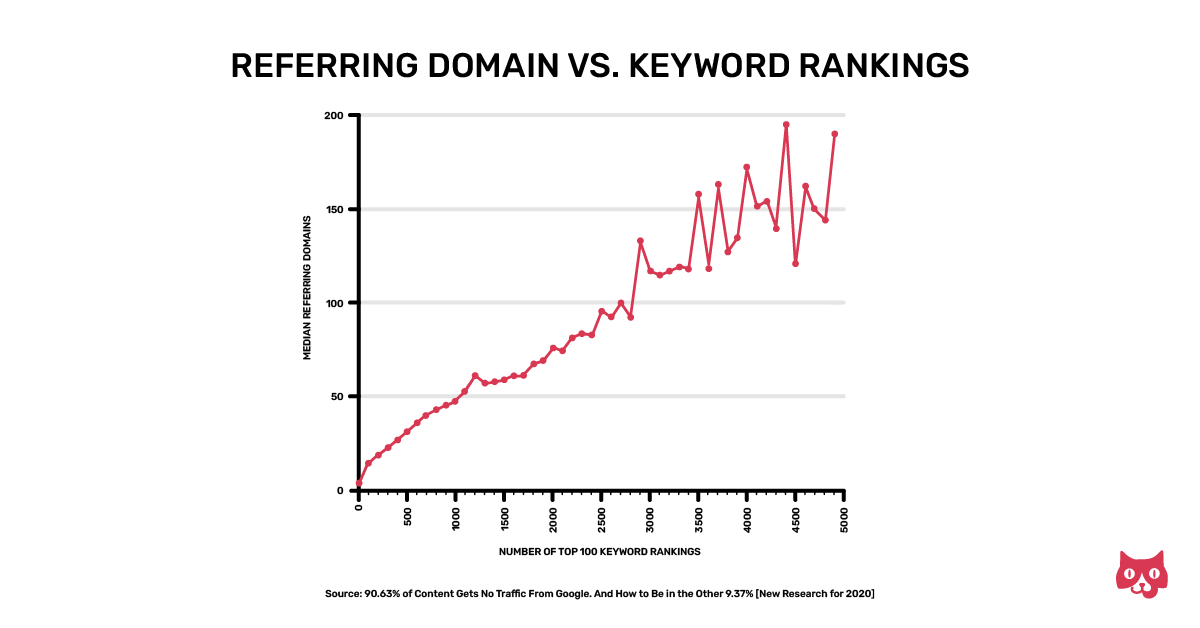
There are tons of other correlation studies which show that links coming from unique websites would be valued higher than links being repeated from the same websites.
Again let’s run this factor in two scenarios for better understanding:
Scenario 1: Your page receives 10 backlinks all from unique websites.
Scenario 2: Your page received 100 backlinks all from the same website.
Outcome: (In most cases) the 10 links in the 1st scenario would have a higher impact on your page’s rankings than the 100 links in the 2nd scenario because links coming from unique domains send stronger trust signals to Google than repeated links from the same websites.
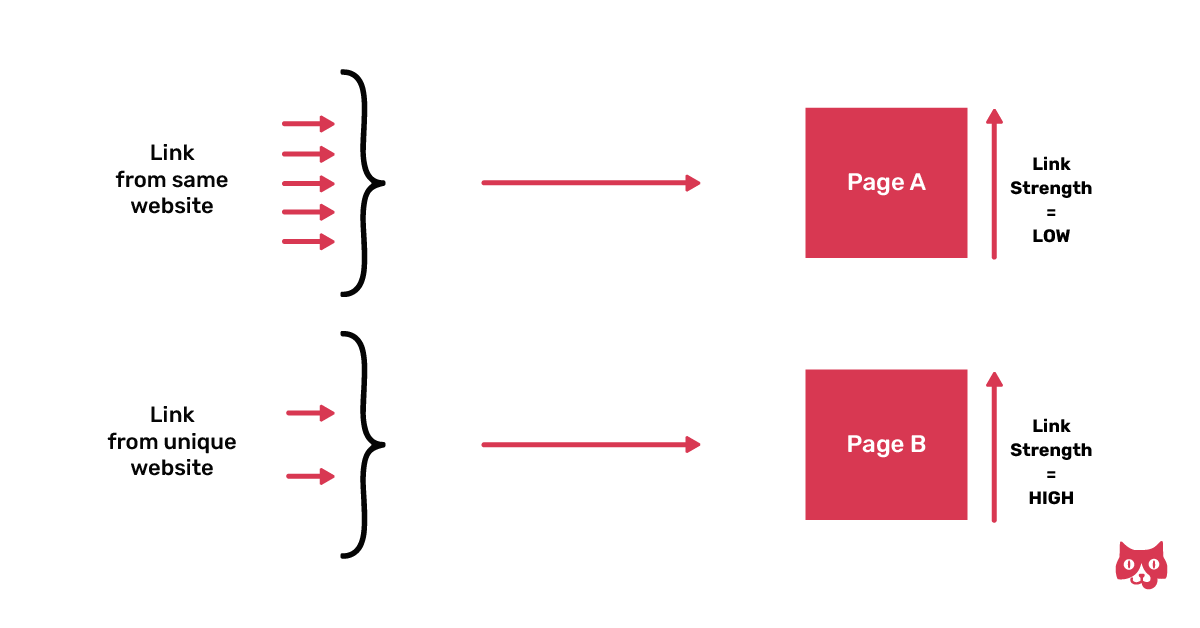
5. Closeness to a trusted source
Whenever there are links built to your page, what you receive as a result is not just one link but a series of links pointing to your page in the form of a chain.
With each tier some link equity is passed onto the other one, however, the closeness or farawayness of your link to a trusted and credible source of information would determine how valuable that link becomes.
The word ‘trusted’ here has to do with the search engine’s perception of a website’s reputation (which isn’t similar to a strong backlink profile) but includes other factors that Google evaluates such as online reviews, sentiment analysis, and/or fact-checking statements. This makes each of the outgoing links of the seed website valued higher.
This factor is associated with a Google algorithm patent called ‘Google TrustRank’.
Running this concept to three scenarios for better understanding:
Scenario 1: WebMD covered breaking news. Your news website covered it too and linked to links to your website’s pages. The level of link depth to the credible source is 1 link.
Scenario 2: WebMD links to page A which links to one of your website’s pages. The level of link depth to the credible source is 2 links.
Scenario 3: WebMD links to page A which links to page B, which links to your page. The level of link depth to the credible source is 3 links.
Outcome: The strength of links to your page in the above-mentioned scenarios would be in this order: Link in scenario 1 > Link in scenario 2 > Link in scenario 3. The reason is the closeness of each link to the trustable source of information, in this case, WebMD.
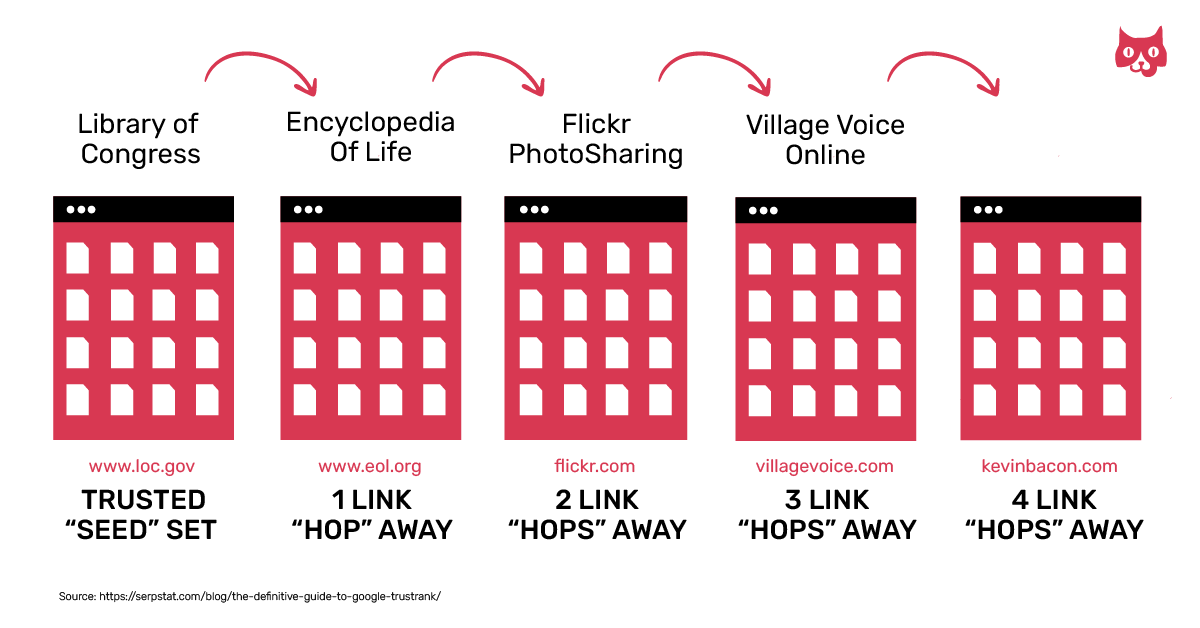
6. Website level topical relevance
Google pays close attention to the topical relevance of a website to determine how much a link coming from it should be valued. This concept is sourced from Google’s algorithm mechanisms such as topic-sensitive PageRank. Topic sensitive page rank is simply a context sentient algorithm that values domains based on their content’s consistency in showing topical relevance/context.
In simple words, you can think of topical relevance/context as the ‘niche’ of your website. And this factor emphasizes the fact that a link coming from a website in the same niche as yours would hold a higher value compared to a link coming from a niche with less relevancy to yours.
Let’s look at an example:
Scenario 1: A website belonging to healthcare links to a page on another website about fitness.
Scenario 2: A website belonging to fashion links to a page on another website about fitness.
Outcome: The strength of the link to your page in the above-mentioned scenarios would be higher in the 1st scenario, simply because it’s contextually relevant to the page being linked.
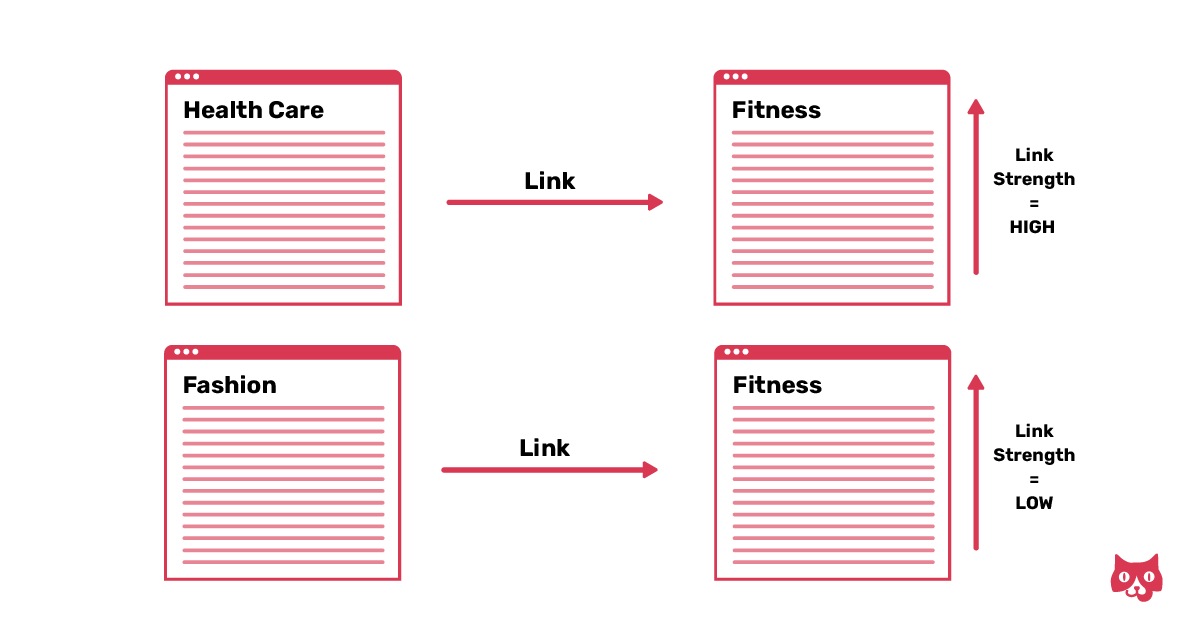
7. Page-level topical relevance
This factor is based on one of the oldest ranking algorithm technologies of Google: phrase-based indexing. This page develops a page’s relevance to specific phrases found in its content with other relevant entities along with the words used in the anchor text pointing to that page for internal and external links. It’s essentially a model that predicts the presence of specific phrases based on the detection of certain other phrases.
What this suggests in plain words is that the topical relevance of a page(apart from the website as a whole (as discussed in the last factor) also plays a key role in determining the strength of a link.
For example:
Scenario 1: A page about best protein powders linking to a page about fitness tips.
Scenario 2: A page about best protein powders linking to a page about mental health tips.
Outcome: The strength of the link to your page in the above-mentioned scenarios would be higher in the 1st scenario, simply because the linking page is topically relevant to the page being linked.
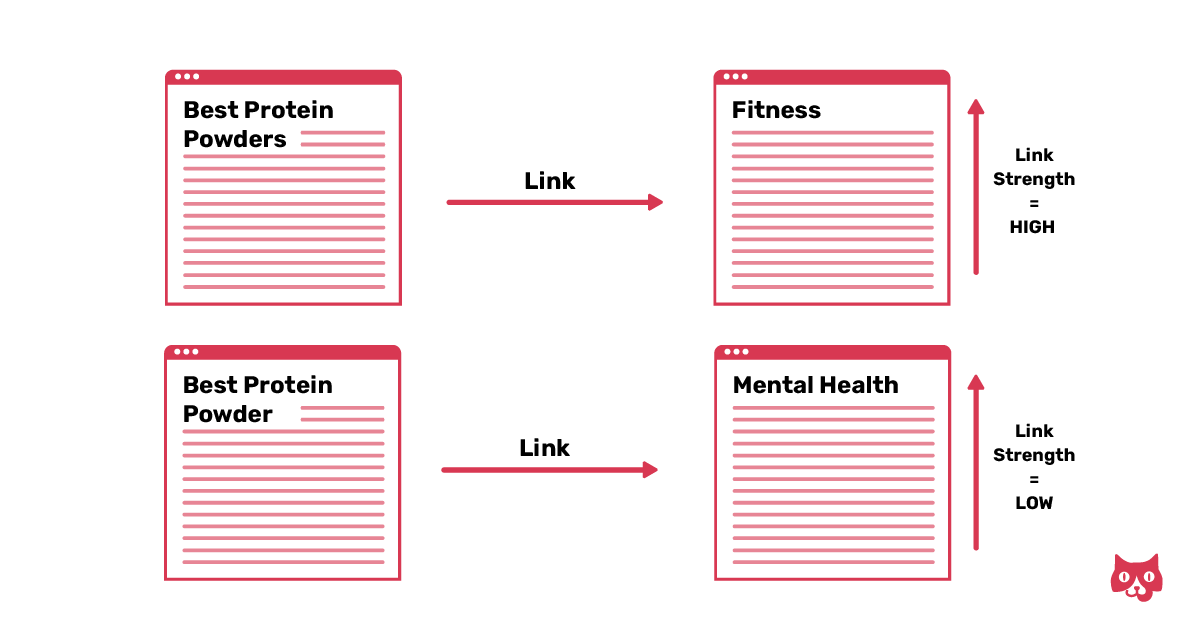
8. Link growth velocity
The actual idea (rather a misconception) of link velocity is that growing your link profile faster over a shorter period will get your website to receive a penalty from Google. However, that’s not the case at all.
Link velocity has been totally misinterpreted. While there isn’t any evidence that faster growth in link acquisition would be harmful, there is a patent called Information Retrieval Based on Historical Data supporting the claim that the growth rate can play some role in general.
Here’s a quick summary of the patent;
- The words ‘link velocity’ cannot be found anywhere inside the patent.
- The patent mentions unnatural links as the base for ‘spiky’ growth of link profile.
- It mentions faster links growth being an advantage for the websites (contrary to what most SEOs believe).
So the bottom line is that the link acquisition velocity for your website would likely have an impact on rankings however, not necessarily in a good/bad way. Google can conduct advanced sentiment analysis, look for unlinked mentions of brands, and index news content around a brand to contextualize the pace of links growth for a website.
Here’s an example to put this into a clearer perspective:
Scenario 1: Website A, belonging to a small local business, gains 10 backlinks in 1 month.
Scenario 2: Website B, belonging to a tech startup, gains 1000 backlinks in 1 month.
Outcome: Google might value link growth for both websites differently based on signals other than their velocity to acquire these links. Scenario 1 would make sense for Google since it contextualizes the limited reach of the local business and the size of the pool of websites that can potentially link to it.
However, at the same time, the 2nd scenario would make sense as well since Google can see if a tech startup raised funding, got featured in hundreds of magazines, and as a result gained 1000 links in a short period of time. Contextualizing the links, Google can develop an understanding of the link’s growth for any website.
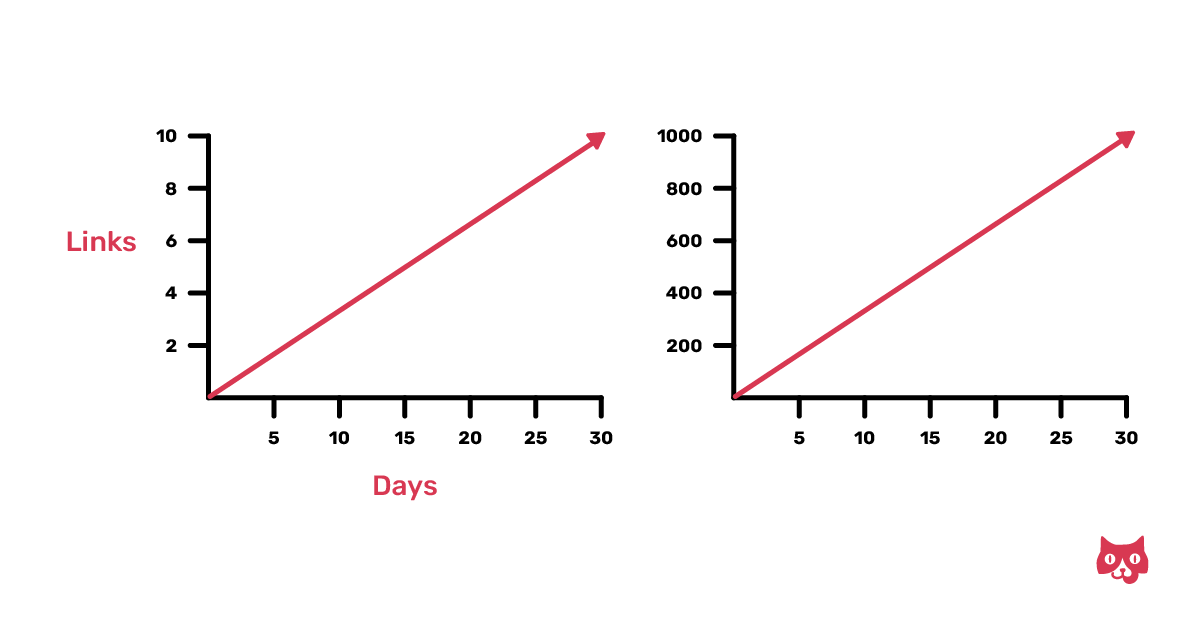
9. Link attributes
One of the basic factors that impact the value of links in the perception of a search engine directly is the link attributes. There are 4 common link attributes suggested by Google:
- Dofollow: to be used when you’re linking to a website that you want to pass trust signals to.
- Nofollow: to be used when you’re linking to a website for reference but don’t necessarily trust/value the source therefore don’t want to pass any trust signals.
- Sponsored: to be used when the link is being paid for or is placed for advertorial/promotional reasons.
- UGC: to be used when the links are being added by the users of a platform without the owner’s permission (stands for user-generated content).
What all of these link attributes do essentially is give search engines like Google a more contextual understanding of a link, so it can value it based on that.
When it comes to straight do-follow vs no-follow link comparison, we know that a do-follow link would pass the link equity to the linked page/website however, a no-follow link won’t.
And when it comes to sponsored attributes, the use case is pretty simple; knowing when a link isn’t naturally attained and the website has bought it (acceptable reasons for links placement for Google can be gaining referral traffic or brand positioning). And finally, when it comes to the UGC attribute, it basically is for sites where user-generated links are in bulk, for example, Quora & Reddit.
However, at the same time, it’s also worth noting that we don’t necessarily know how link attributes are perceived by Google on their end. And it means there can be scenarios when a no-follow link is valued equal or even more than a do-follow one based on some other external signals.
Here’s a scenario-based example for better understanding:
Scenario 1: Website A links to website B using a do-follow link.
Scenario 2: Website A links to website B using a no-follow link.
Outcome: The backlink’s value from a link equity and trust strength would be higher in 1st scenario because with a no-follow link the website A has explicitly told search engines that it doesn’t trust the website B and is linking for reference purposes only – which means that Google will not consider any link equity passed from to the website B.
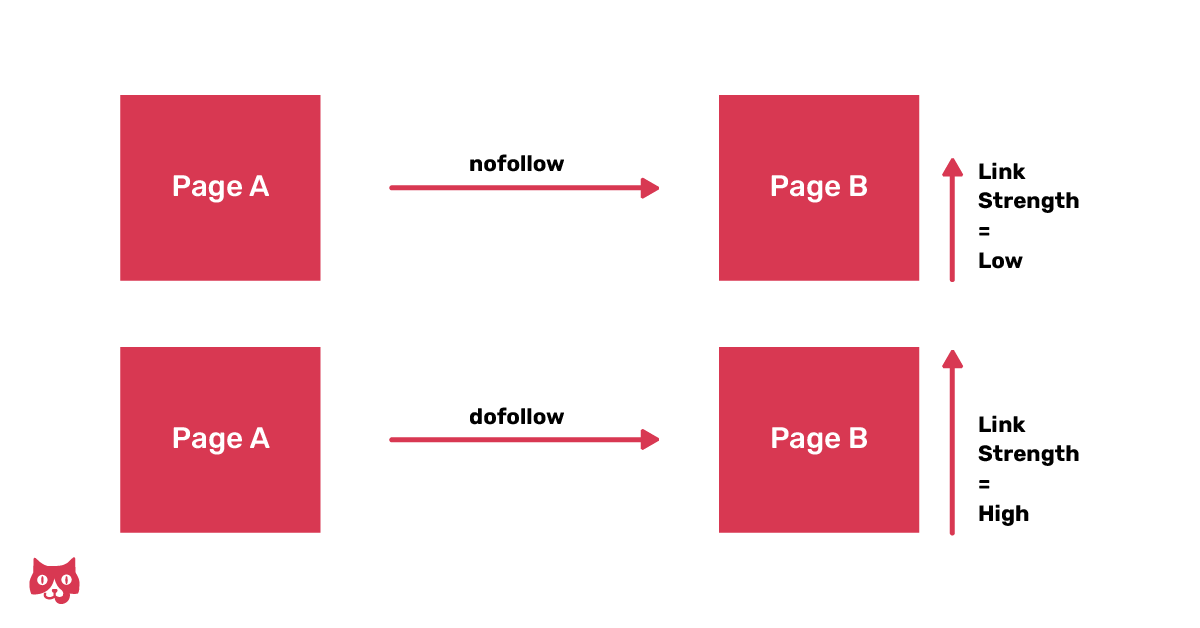
10. Unlinked mentions
There is a popular Google algorithm patent called “Ranking search results” that talks about implied links. This document basically describes how Google might use brand mentions (not just brands but mentions of any entity) on the web’s content as a source of developing authority for that brand.
How does this work? Basically, the patent says that whenever a searcher types in a branded search query and clicks on a specific site from the SERP, Google can notice that connection of the query and the website the searcher hits.
Google would keep that context of branded search secured and in the future, if the brand is mentioned anywhere on the web’s content, it’ll use that context to empower the rankings weightage of that website.
And this makes 100% sense from the perspective of a search engine like Google to know which websites to trust. They can’t rely on links solely since it’s easier to be manipulated, so coupling it with other “expressed” or “implied” links would give leverage to filter purely trustable websites on the internet since those would earn a good amount of unlinked mentions as well.
So in a scenario-based example, this is what it’d look like;
Scenario 1: Website A has 500 referring domains linking to it with a do-follow backlink.
Scenario 2: Website B has 300 referring domains to it with a do-follow backlink and 200 unlinked mentions.
Outcome: It can be the case that website B in the 2nd scenario outperforms website A simply because the trust signals Google is receiving from it are more diversified. PS: We’re looking at this isolated example here otherwise there’d be hundreds of other factors influencing the outcome and the outcome wouldn’t be the same of course.
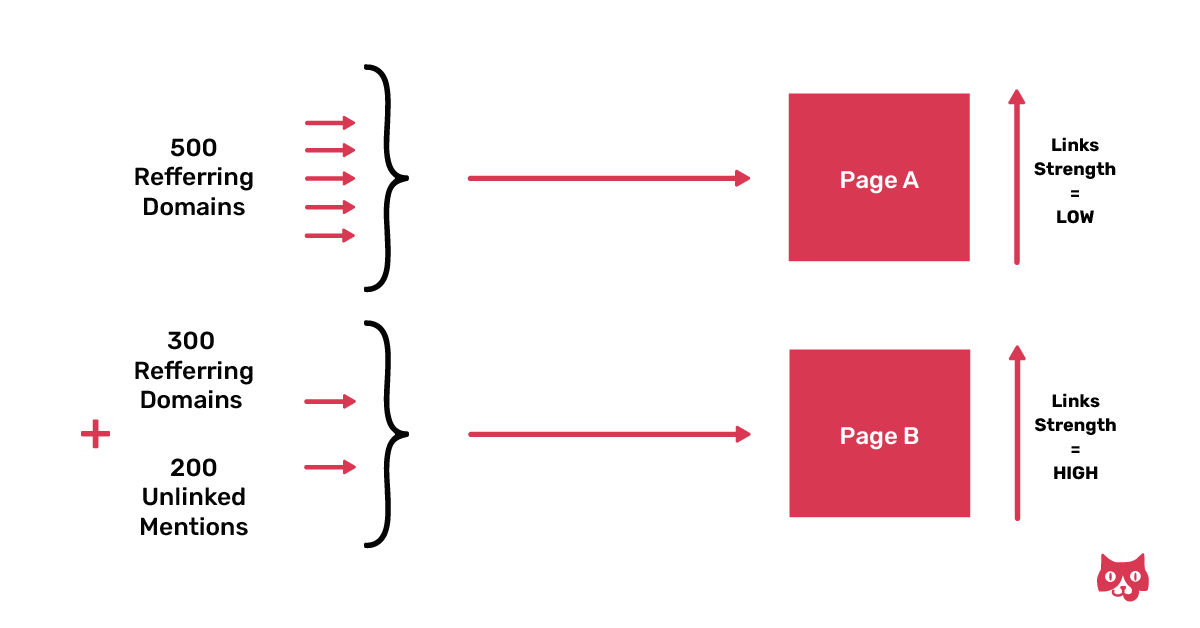
11. Linking page’s freshness
Google values content freshness for the searchers to have a flawless experience of solving their problems with the latest content on the web. Therefore, it values the content that’s (relatively) fresh and up to date over content that isn’t.
And since the freshness of content on a page can impact its overall quality (although not so big) it can leave an indirect impact on the links inside that content. There’s a Google patent named Document scoring based on link-based criteria that tells somewhat of a similar story.
It’s worth noting that the same patent mentions that the scale of the changes brought to a content piece for hitting freshness would be a variable in this case. For example, if a page with a lot of content experiences small changes in it, Google won’t add a significant value to its weightage.
And again, let’s use our scenario machine to bring clarity;
Scenario 1: Webpage A links to webpage A and the content of webpage A was last updated 5 years ago when it was published.
Scenario 2: Webpage A links to webpage B and the content of webpage A was recently updated for higher content freshness.
Outcome: The value of the link in the 2nd scenario would be slightly elevated since the content on the page as a whole would experience higher value from the search engine’s perspective.
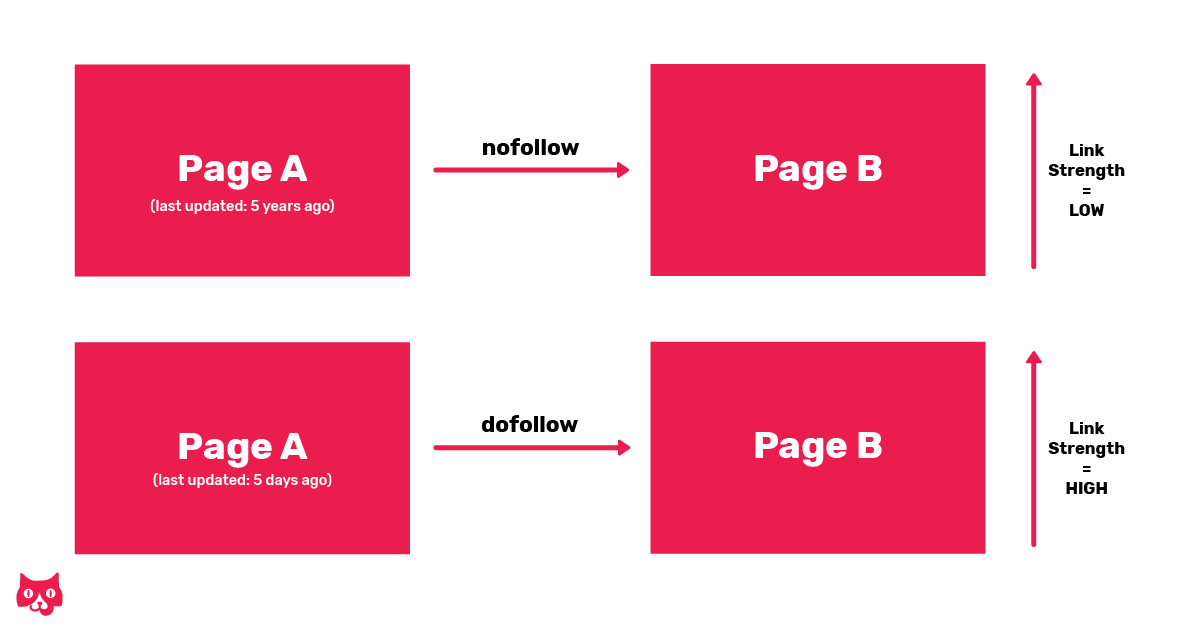
12. Link echoes a.k.a. link ghosts
Although not supported by a credible source such as any patent, there’s a theory often tested by many experiments which essentially says that a link might persist the rankings benefit for the page it’s targeted towards even after the link is removed from the page where it was placed.
Rand Fishkin, former CEO of Moz and now the founder of SparkToro has run multiple experiments and the data validates this theory. The reason? Basically, once a page is up in the rankings, with links playing a crucial part in getting it up to the top of the SERPs, there would be other user-behavior metrics that Google would pay closer attention to even if the links pointed towards that page are removed.
This gives us another interesting perspective that the quality of the content still holds massive value since with user-behavior signal’s measurement Google will ultimately drop your page from the ranking spots.
Since this factor is really clear and straightforward, we don’t need a scenario-based example to depict what this means practically.
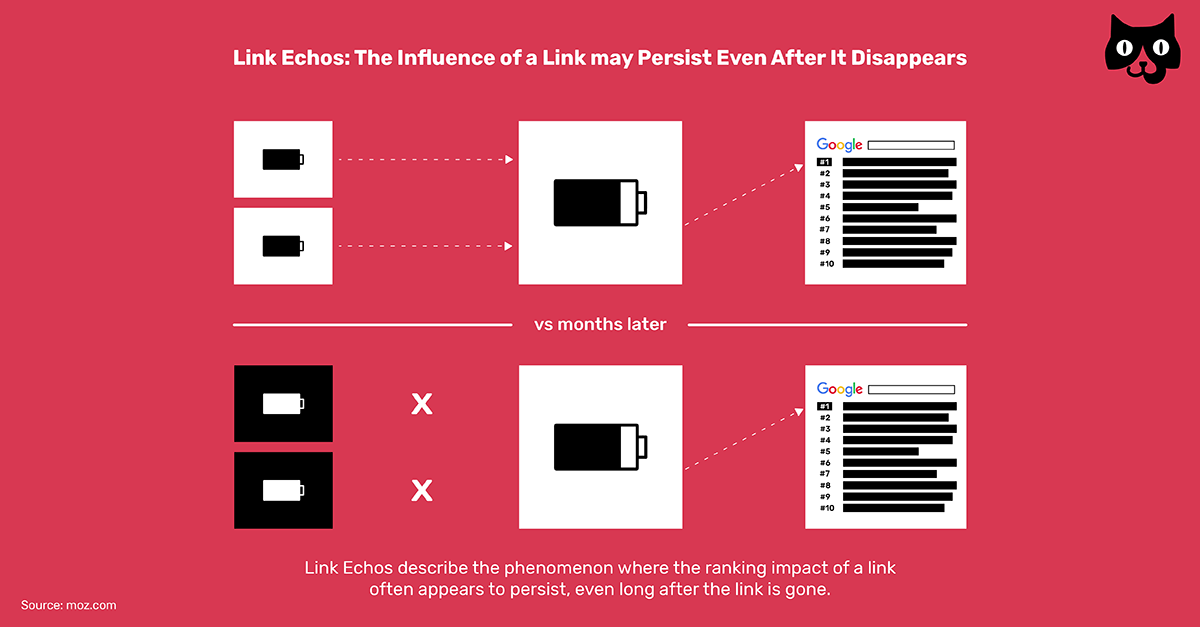
13. External linking quality
Google is great at building relationships on your website with others under specific contexts. When a website is linking to some authoritative sources within a specific subject matter, Google would detect it and based on that will give some advantage to the links going out of your website.
This really depends on how well your external linking practices have been maintained. If your website acts as a link farm: selling links, for example, Google would drop the value of the links going out of your website since it can detect unnatural patterns such as;
- Consistent keyword centric anchor texts
- Contextually irrelevant placement of links
- The quality of the websites being linked to as external sources
Google possibly evaluates hundreds of other factors to evaluate how good of external linking a website has but those aren’t public for sure, not at least till now.
Again, let’s turn to our scenario formula to make this concept clearer:
Scenario 1: A website about restaurants mostly links to other authoritative websites about recipes with a diverse and natural anchor text collection.
Scenario 2: A website about restaurants mostly links to a bunch of random newly made websites on every other page on itself, with a highly keyword-centric set of anchor texts.
Outcome: The value of the links coming out of the restaurant website in the 1st scenario would be significantly higher than the 2nd simply because the quality of external links in the 1st scenario was well maintained.
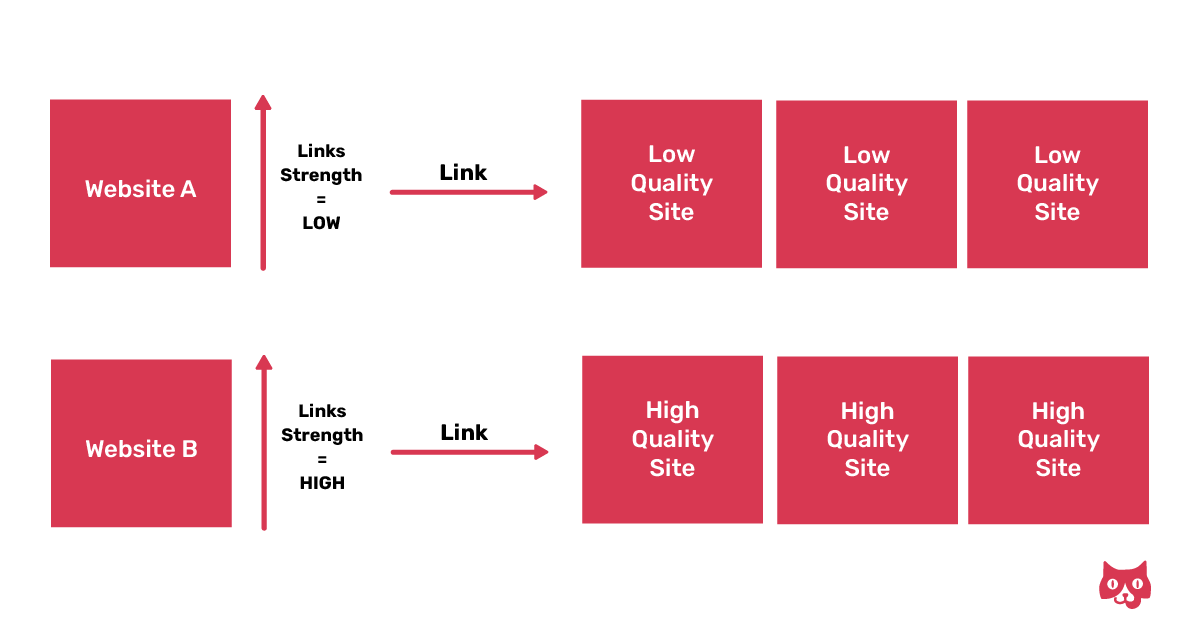
14. First link priority
This factor mentions that if there are 2 links on a page pointing to the exact same URL/page, then Google would value the first link discovered more priority/value. Oftentimes Google would associate a unique value to a page based on the page rank it receives from the links pointing to it and the relevancy added by anchor texts.
And in the above-mentioned scenario, Google would pass PageRank, that’s exactly what the original PageRank patent suggests, but no anchor text value to the 2nd link on the page (provided that both link to the same URL/page).
Here’s what we mean practically: assume an article on fitness diet and healthy eating consists of two links, both linking to another article about “Keto diet”. However, the anchor texts of the two links differ:
Scenario 1: The first anchor text is “Keto diet” and the second one is “Diet”.
Scenario 2: The first anchor text is “Diet” and the second one is “Keto diet” (just shuffled the order).
Outcome: The page (about Keto diet) being linked to would receive more value out of the link in the 1st scenario since Google will value the anchor text of the 1st link to the page only and in the 2nd scenario the first link’s anchor has the “Keto” relevancy eradicated.
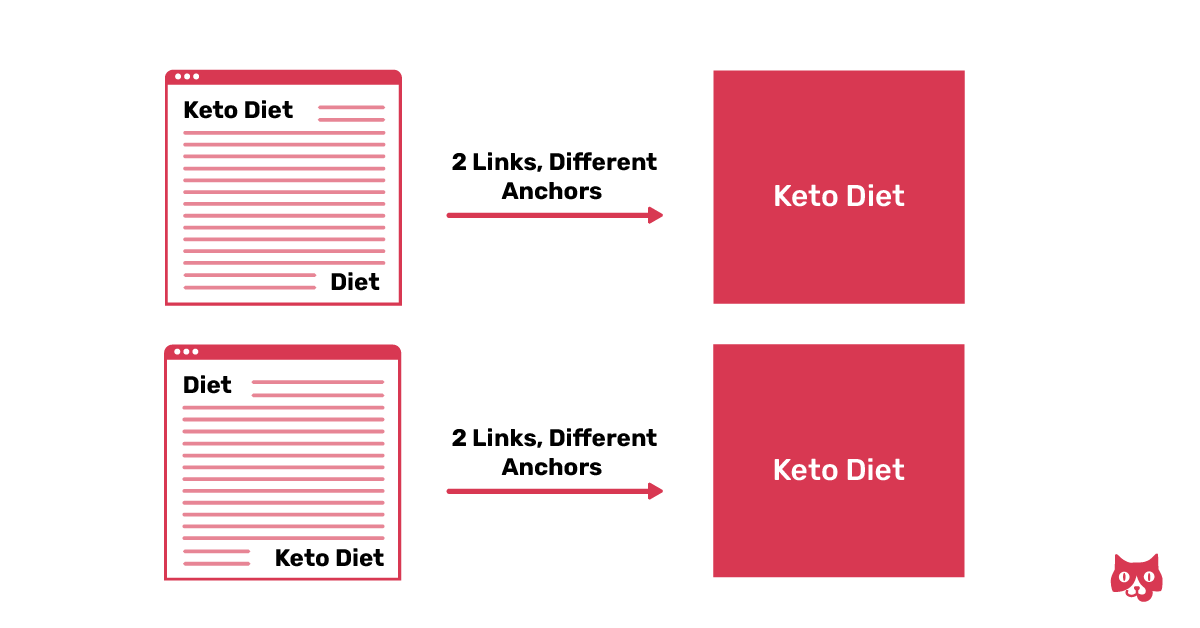
Types of off-page SEO (other than link-building)
Even though link building is a big chunk of off-page SEO, still it’s not all of it. In the broad universe of digital marketing, off-page SEO is considered anything that’s done outside of your website to make your website SEO friendly.
And of course, this includes a lot more than just having some links pointed to your website. So let’s explore what all other forms of off-page SEO can be:
1. Brand mentions
Building a brand is perhaps the best marketing advice for any company of any size. And when it comes to search engine optimization, having a strong brand would benefit your SEO in many different ways.
Earlier we’ve discussed how Google might use brand mentions as a direct ranking indicator, calling them ‘implied’ links in one of their search algorithm patents. However, brand mentions go way beyond just higher rankings and can drive an indirect impact on your organic growth strategy.
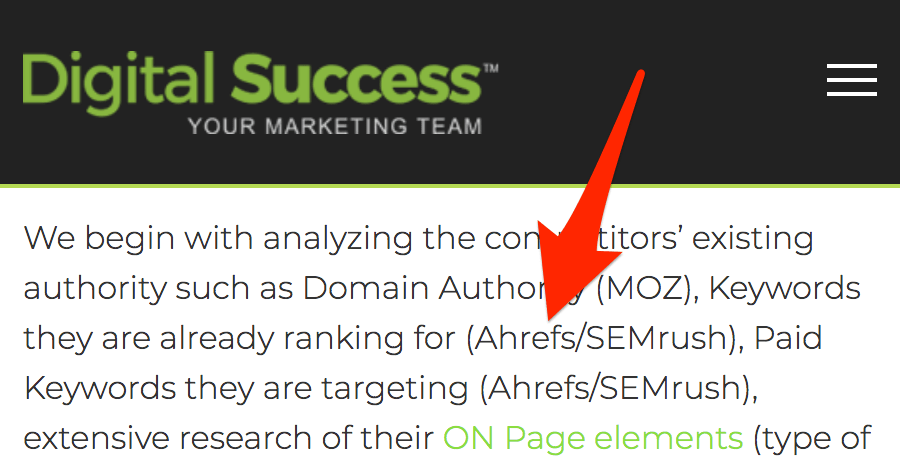
Benefits of brand mentions (other than just rankings)
Here are some of the benefits worth mentioning:
- Brand awareness & visibility: It raises your brand’s awareness and visibility for both search engines and users to easily come upon your brand from various sources on the internet. Meanwhile, it also helps both parties develop a deeper understanding of what your brand is associated with.
- Helps discover brand personality: It gives your brand a personality and helps you identify opportunities for improvement. For example, online reviews of your brand would help you know how your users feel about your brand and according to the outcome you can mold your content’s tone of voice and your brand’s positioning.
- Helps earn links via unlinked mentions: It can unleash even more link-building opportunities for your website. You can get in touch with the platform’s owner where your brand has been mentioned but hasn’t earned you a backlink and ask them to do so. And since the website has already mentioned your brand (they’re aware of what your company is) there’s a high chance of you getting a link out of this.
How to enhance your brand mention?
Earning brand mentions across the web isn’t a binary equation since there is not a single way of building your brand. It involves everything from having a competent product/service, a unique selling proposition, and an outstanding marketing strategy.
However, at a tactical level, we can break it down to the following practices:
Guest blogging: Guest blogging or guest posting isn’t just a practice for getting a link back to your website. Being conscious of the platforms you contribute to as a guest author can get you a lot of referral traffic as well as brand visibility to a new audience.
Social media promotion: Being active over social media platforms where your audience resides is always a good strategy. It helps you to capture your audience even when they’re not visiting your website, hence increasing your brand’s overall recall in the consumer’s mind.
Using modern-day influencer marketing: Influencer marketing isn’t just about models with massive social media followings. It’s about the sources of influence a specific audience might have and value. For example, for us as SEOs John Mueller (Webmaster Trends Analyst at Google) can be an influencer. In the same way, your audience would have specific people who influence their narrative. Using those people’s voices to reach out to your potential customers and raising awareness about your company can again enhance awareness for your brand.
One way of checking how well your brand is growing organically, you can check the increase in branded keywords. Using any site exploring tool like Ahrefs or SEMrush for example, you can see if more and more of your consumers are now searching with branded keywords, and this tells you the clearer story of where your brand is moving in organic search:
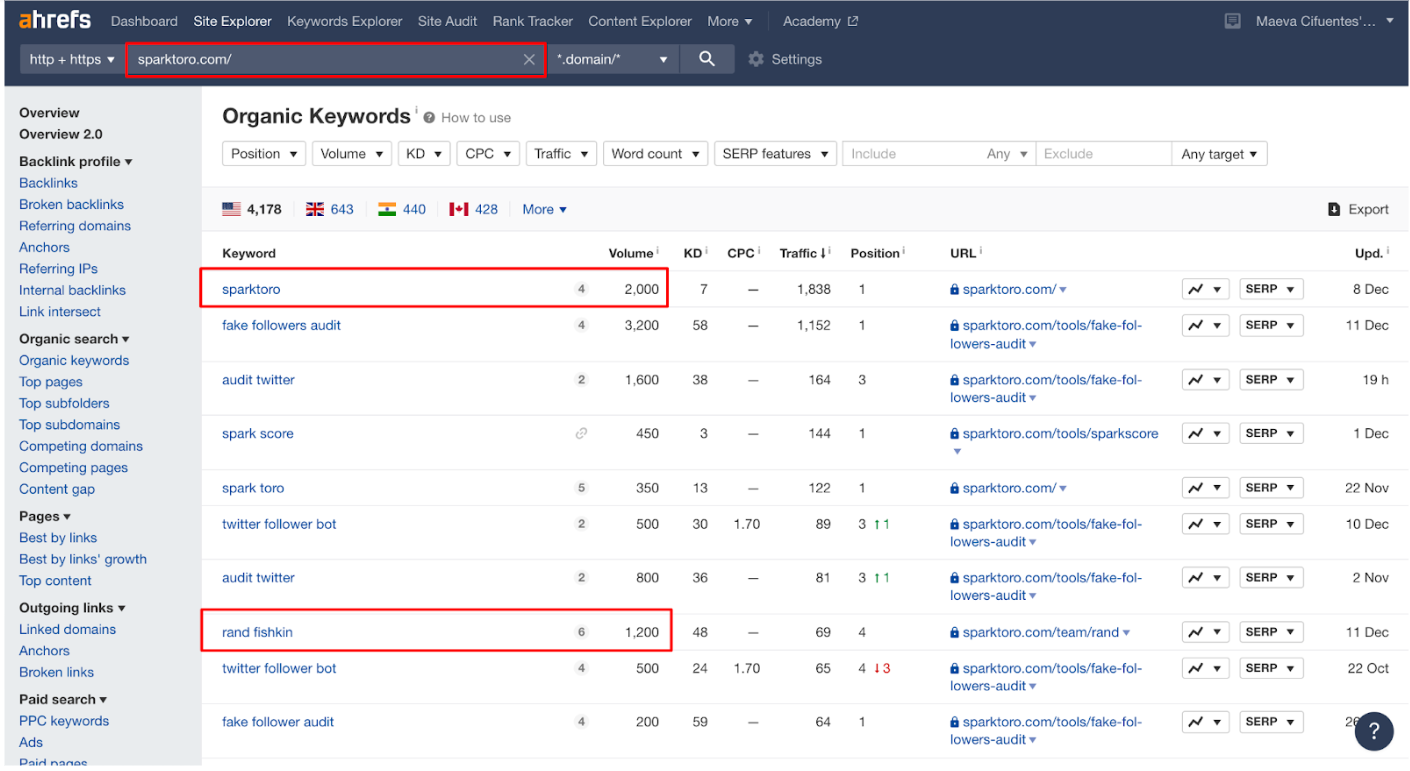
2. Public relations (PR)
Till now you must have noticed that an SEO needs to be highly analytical and digitally savvy. You have to be objective, technical, and data-driven to succeed as an SEO. However, when it comes to off-page SEO it’s more about relationships than technical work: since you have to cash out relationships with bloggers, journalists, or editors to earn links.
When it comes to digital PR, it’s all about building great content and elevating it to reach top-notch storytellers or journalists, usually on the basis of well-established relationships with them. And in the same manner, one can earn backlinks in the process as well.
The great benefit of PR link-building is that it can yield the highest results for the least amount of effort invested.
Here’s an example – when Rand Fishkin, founder of SparkToro, wanted to generate links he was using his own product to reveal interesting data stories which oftentimes yielded compounded returns in off-site promotions and links. In 2018, they published a post titled “We Analyzed Every Twitter Account Following Donald Trump: 61% Are Bots, Spam, Inactive, or Propaganda”.
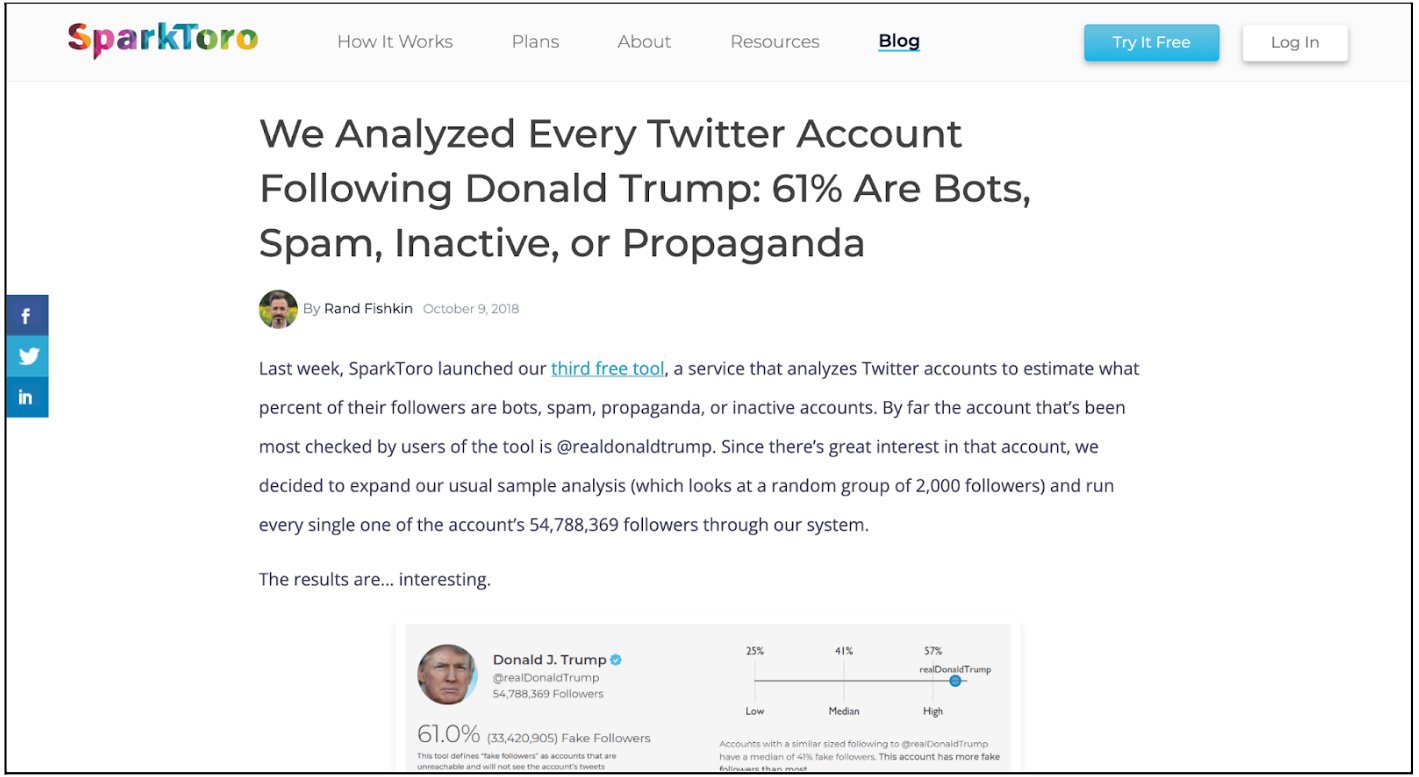
The post was everywhere in just a few days of it going live. Companies like Quartz, The Times, and Mediaite covered the data as well, landing SparkToro links from all these gigantic websites.
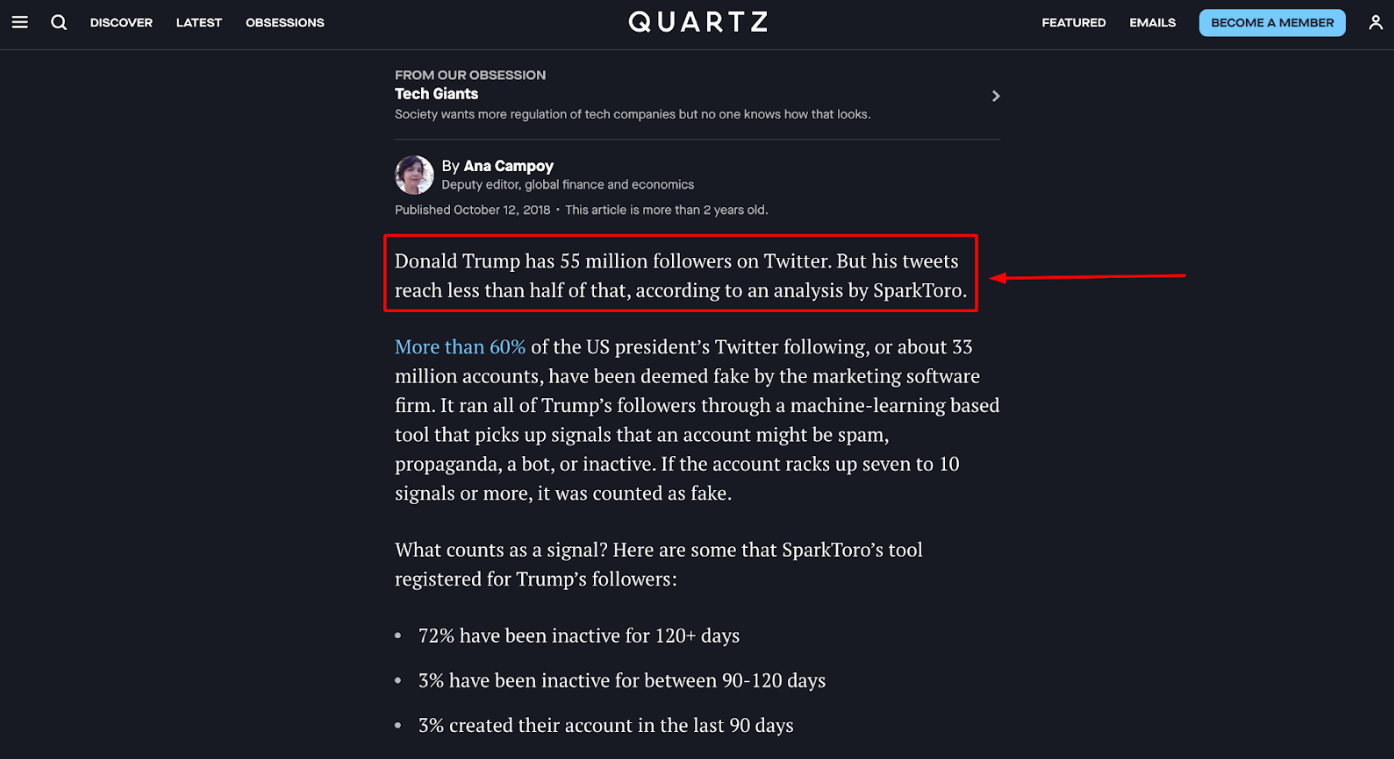
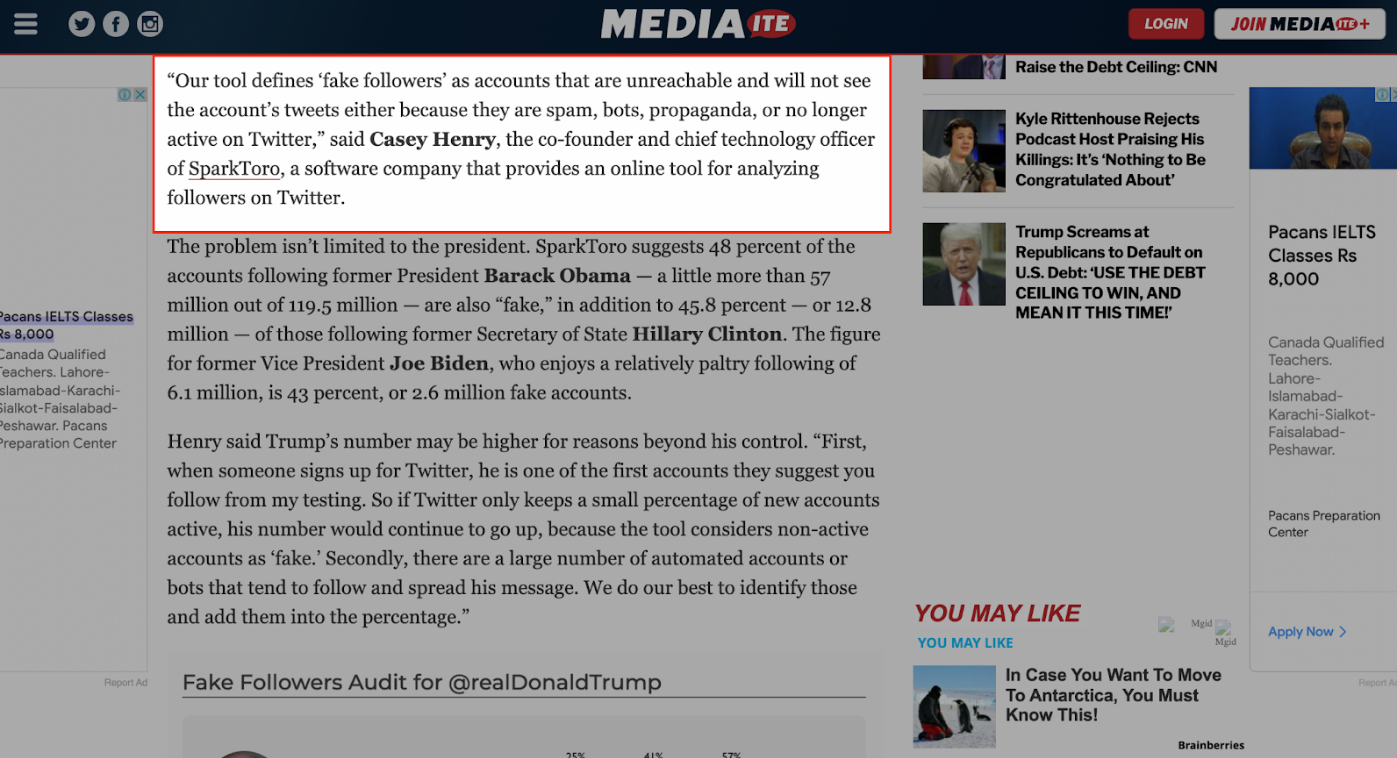
The result of this story? Sparktoro earned a total of 145 referring domains (the majority being of the quality of the sites mentioned above) and 260 backlinks:

When a typical SEO approach would have been to do 200 guest posts and send thousands of outreach emails, Rand Fishkin invested all that time in putting together a piece of content that’d get viral and put link-building on auto-pilot for them.
NOTE: Remember, Sparktoro generated this many links and awareness for itself in 2018 when it wasn’t even fully launched as a product for the consumers to use.
3. Directories & citations for local SEO
What’s unique in SEO is that there are no absolute practices that’d work for every vertical. In order to succeed your approach would need to be tweaked based on whether you’re doing international, multilingual, or local SEO.
The same is the case with off-page SEO specifically.
Generally, off-page SEO practices would be link-building from other authoritative websites like a blog in your niche. However, when it comes to optimizing for local search the off-page SEO practices include the following:
- Google My Business listing
- Regional/local business directories’ citations
- Industry-specific directories’ citations
- Local newspapers
- Local industry-specific magazines
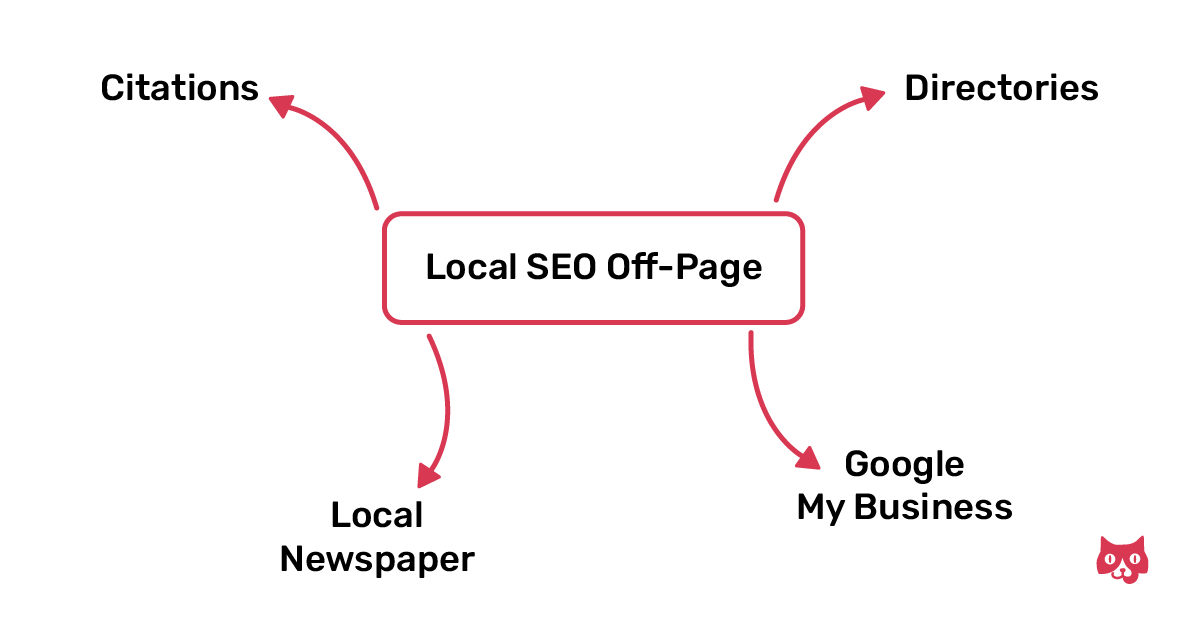
The question now is, why exactly region-specific links are needed and how exactly do they help enhance results for local SEO?
The answer to the “why” lies in the fundamentals of link-building, a major component of which is “context”. With links search engines usually are investigating the contextual value of the website being linked, to know whether it deserves to be ranked higher for specific keywords or not.
In the same manner for local SEO, having links from local directories or any region-specific websites would assist Google in determining if a specific business’ website is worthy of being ranked higher for region + need specific keywords.
For example, if you’re in New York standing near Times Square, and search inside Google “Coffee shops near me” these local + topically relevant links would determine if Starbucks should be ranked higher in the local map pack or Dunkin Donuts.
And when it comes to “how” impactful are these off-page signals for local SEO, here’s research by Ahrefs that tells us how much value does on-page and off-page signals hold for local SEO rankings (both in snack pack and local organic results).
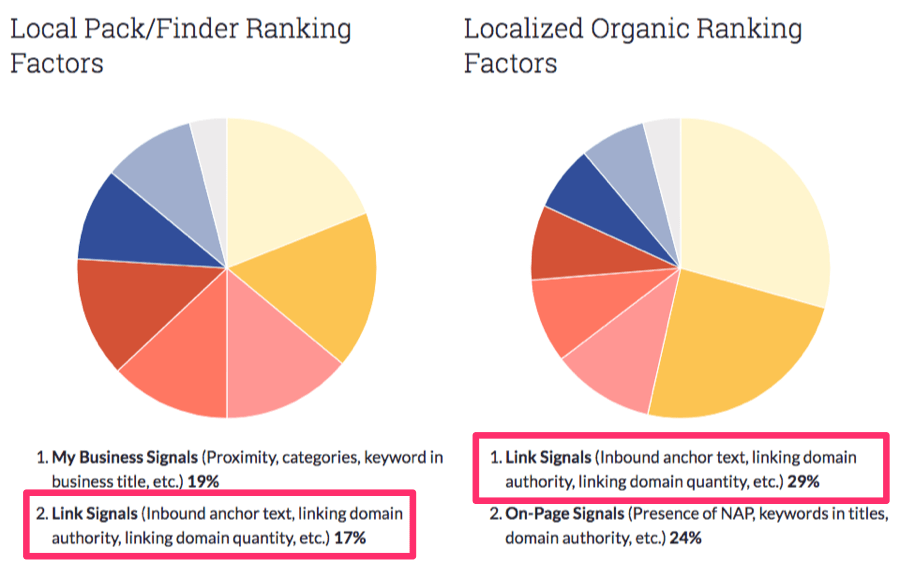
- For local pack, off-page factors account for a total of 36% of all the SEO factors that impact rankings.
- For localized organic rankings off-page factors account for 29% of ranking influence.
In short, the efforts that go into off-page optimization for local businesses are totally worth it.
Social Media
Social media is often considered useless from a sole link-building perspective. Back in the day, many SEOs believed that having social signals (like retweets, Facebook likes/shares, etc.) impact the organic search rankings however in 2010 Matt Cutts said out loud that it’s not the case.
Here are a few reasons why using social media signals would not make much sense for Google as part of the off-page signals:
- Most of the social media platforms like Facebook and Twitter block major components of their platforms from search engine crawlers like Google. So it’d not make sense for Google to rely on half-detailed content for ranking search results.
- Social media platforms aren’t always authentic and can be manipulated easily. No matter how much these platforms try filtering out fake accounts/pages still a big chunk of the platform would incorporate untrusted data which by no means can be used by search engines in their ranking algorithms.
- Social media is only based on popularity metrics and doesn’t cover the relevancy part very well. For example, simply because a fast-food restaurant has millions of likes on Facebook, it doesn’t mean their pizzas are of the best quality.
Although there are limitations for social signals to be used as a ranking factor, still the use of social media isn’t bad, and in fact, can empower your off-page campaign indirectly. For example, you can use social media to:
- Build connections that can be later used for link-building.
- Build your brand which can lead to passive brand mentions.
- Drive brand awareness which can then lead to branded searches inside search engines
- Distribute unique content which gains traction and acquires links.
- Drive referral traffic to your content pieces right from those platforms.
![]()
4. Forums & communities
Forums are online communities where users hang out to interact with relevant audiences, find solutions to their problems, and exchange ideas. There are some generic community websites like Quora and Reddit and then there are industry-specific forums for almost every niche you can imagine.
Although we’ve already discussed how links from forums aren’t provided much of a value by search engines, since they’re user-generated links, they can still be used for great off-page promotion of your website.
For example, for a general forum like Quora, you can search for keywords related to your audience/niche and see the questions people are asking. If you have anything to add value or share a resource that would help that audience solve their problem, throw it in.
Let’s take an example of how it can be done practically. This blog post that you’re reading right now is a piece worth reading for any off-page SEO-related answer, right? Well, let us find some people who’d find it helpful and share it with them.
Let’s go to Quora and search for the keyword “off-page SEO”.
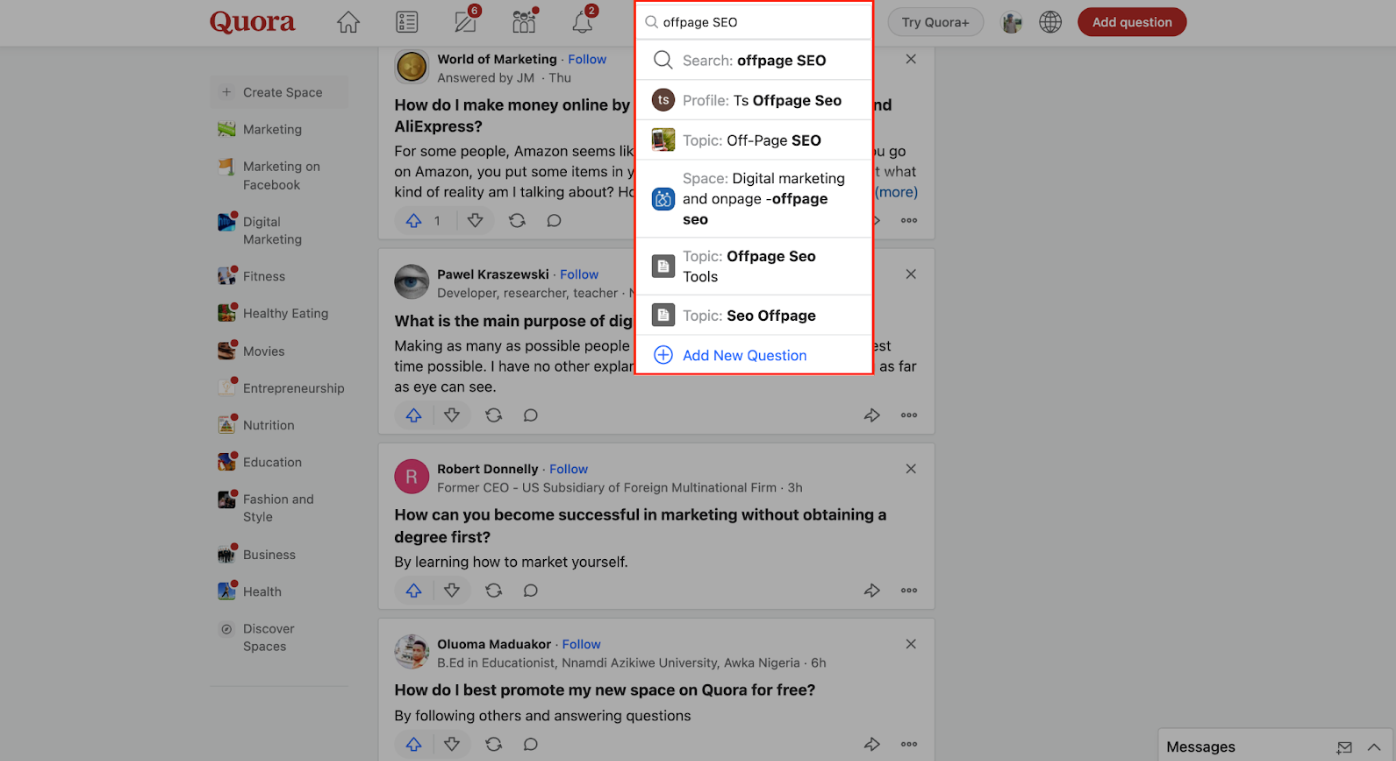
This is what we can see from the results:
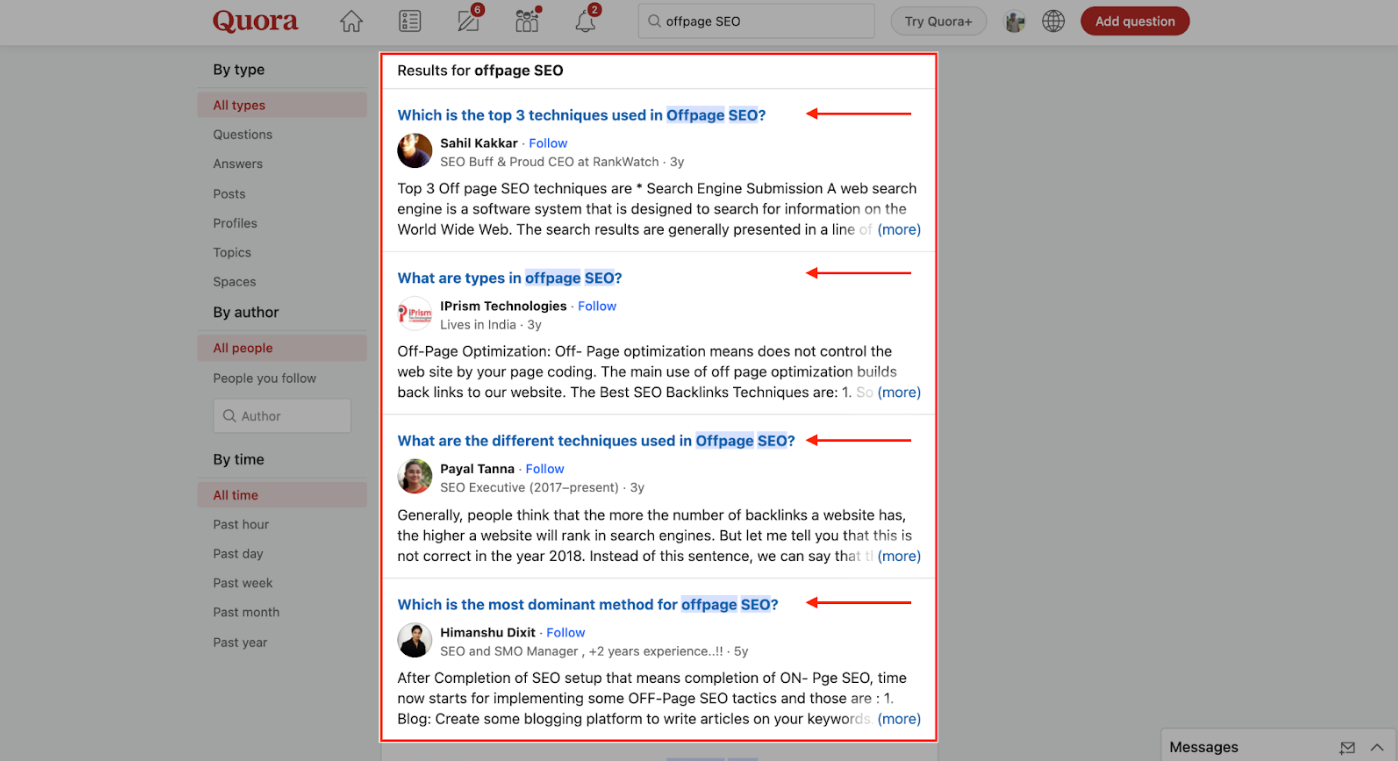
Looks like, for any of these questions, we can answer and leave this post as a reference for an in-depth read. So if we pick one of these, this is how I’d respond to it, referencing this post:
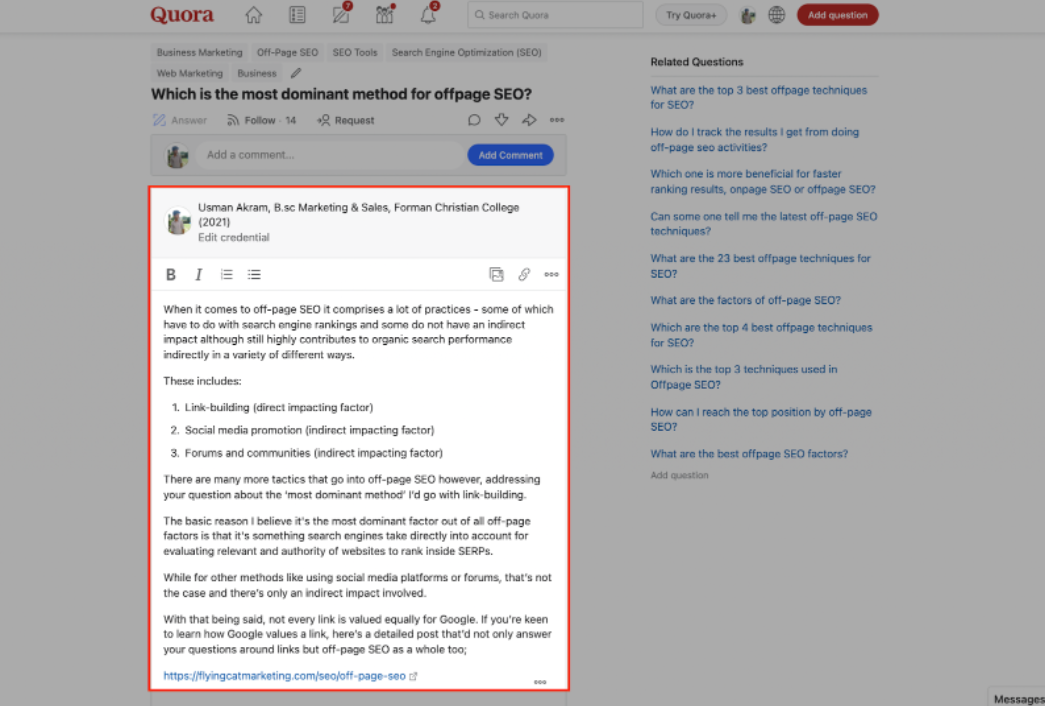
This way you’re opening windows for referral traffic as well as earning links indirectly since if those readers consume your content and that fulfills their intent, they’d be happy to link to it or reference it at any point in time.
5. Events & conferences
Events are probably the most underrated technique for off-page promotion of your brand/content. The reason behind their underrated-ness is that they’re mostly offline and are based on human interaction which has nothing to do with typical link-building methodologies like outreach emails etc.
However, the truth is events can be highly leveraged to your advantage if you know where to spend your time and resources. The problem with the typical link-building approach is that the person asking for a link is cold messaging another person with whom they have no existing relationship.
And the benefit of actively participating in events is that you get to expand your network which indirectly can lead you to many partnerships, PR, and link-building opportunities. So the next time before sending cold outreach emails with ghost ID’s you’d already have a network for folks to collaborate with for link opportunities from whom you can expect to hear as well.
Another way of cashing out events for links would be sponsoring an event. An example of this would be when SEMrush sponsored the Social Media Marketing World event they received a link back to their website:

And of course on the contrary, if you’re the one hosting events, your chances of attracting links even increase. For example, the Social media examiner releases a list of recommended social media conferences usually in which they link to each of the conferences in the list:
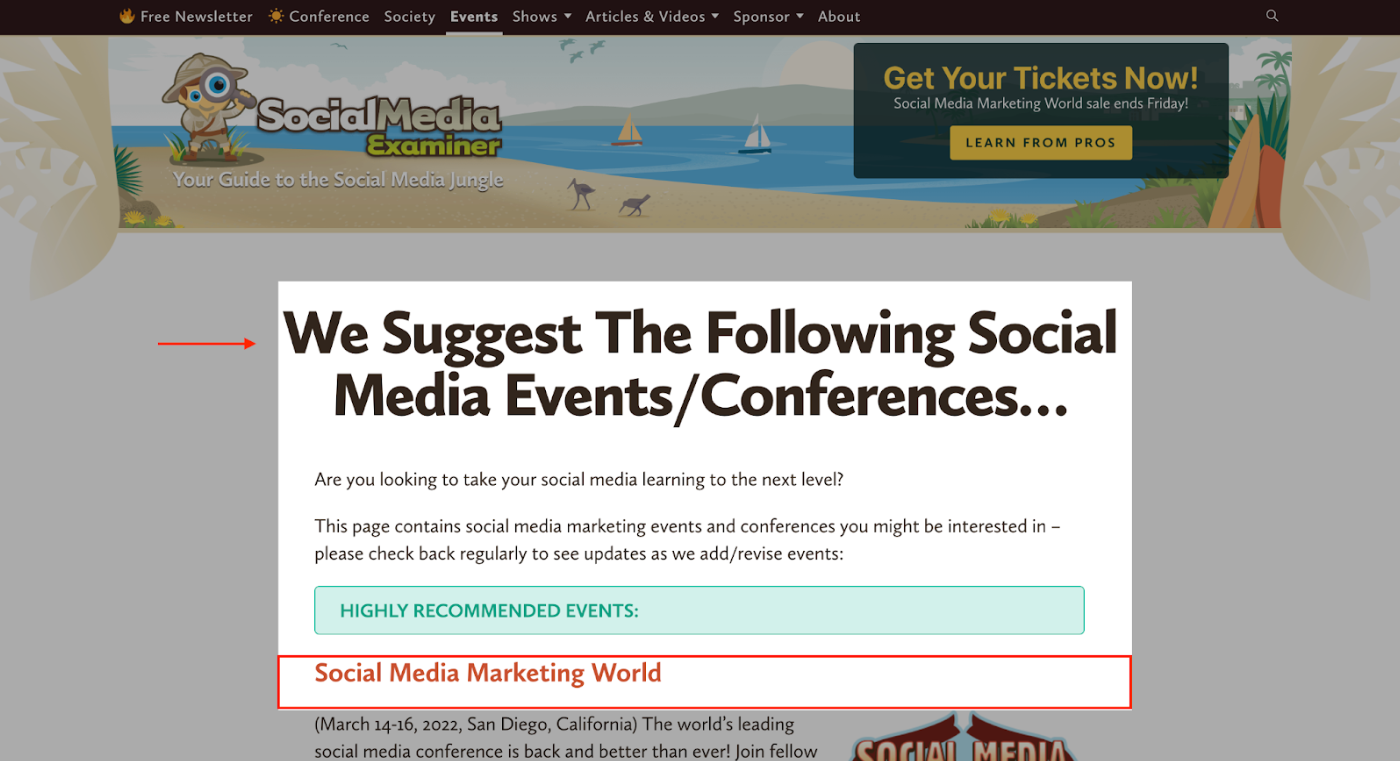
6. Podcasts
Podcasts have been becoming more and more important for companies for marketing purposes and they will likely continue to grow. It is a format that marketers are using for all sorts of different reasons: building a brand, building a community, creating content and of course, with our point, it can also be used as an off-page SEO hack.
There are basically two ways you can use podcasts to build your backlink profile up:
- Create your own podcast, publish great content and acquire links as soon as your podcast starts to take off in your niche.
- Be a guest on other people’s podcasts from your industry, since your website will likely be linked to when you’re referenced as a guest on the show.
All you need to do to find podcast opportunities in your industry is to use the following search operator: “Keyword” + “Podcast”.
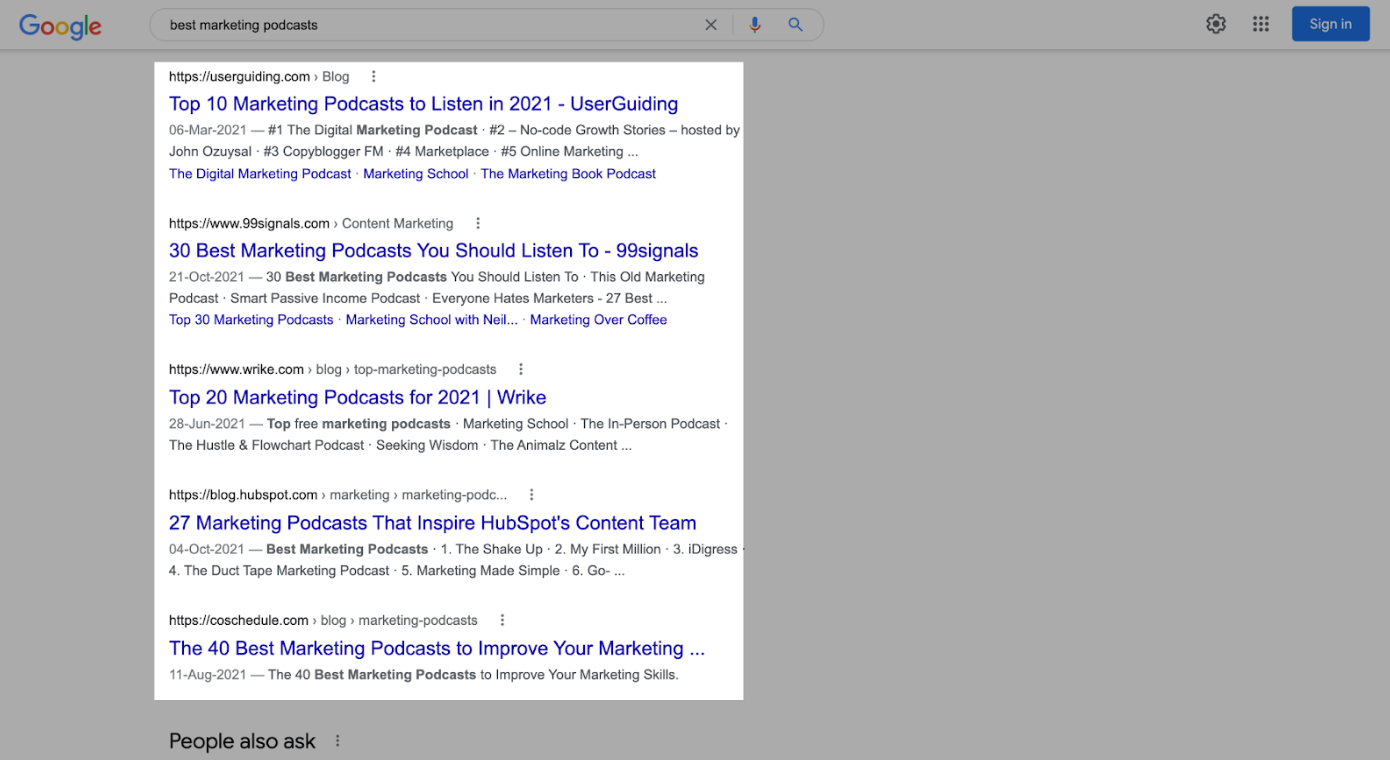
And as soon as you start seeing some good podcast recommendations, you simply need to reach out to them via email and offer to unleash your insightful expertise on their show to be invited.
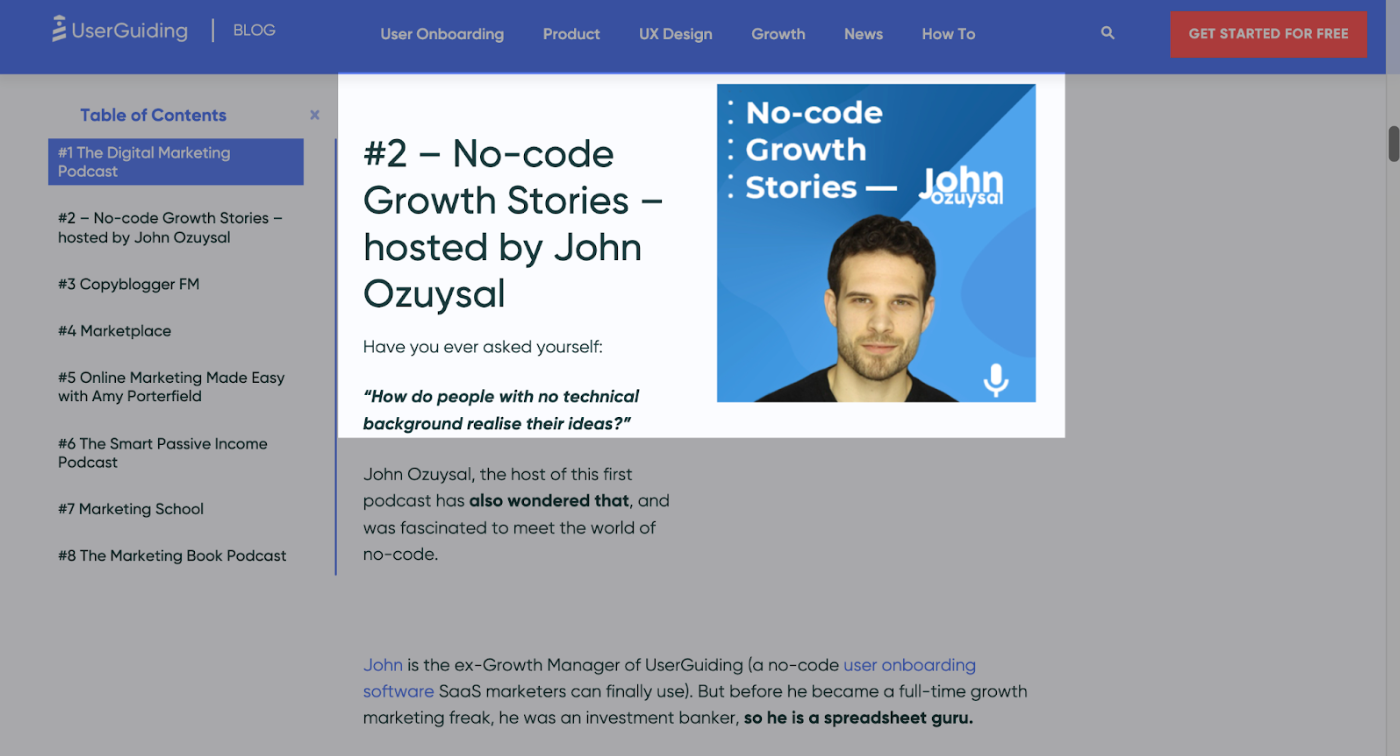
The thing with podcasts is that you want to find a balance in their popularity to be invited as well as getting a link from a website with good domain authority.
7. Reviews
Search engines crawl the entire web which pretty much means they have access to content on billions of pages. And with technologies like natural-language-processing (NLP) search engines like Google are incredible in their capacities and effectiveness of content’s sentiment analysis which basically means interpreting the emotions behind the content. There is a patent named “Domain-Specific Sentiment Classification” supporting this idea as well.
However, the benefits of gaining online reviews go far beyond rankings. Having positive reviews for your product or service online would build trust for anyone considering your product/service for the first time. This means reviews would be critical in your potential customer’s decision-making process of whether they should go with your product/service or your competitors.
So how do you use reviews to your advantage? There are platforms specific to different verticals where you can register your company and start attracting reviews. For example:
- There is “Clutch” for agencies
- There is “G2” & “Capterra” for software
- There are “Google My Business” listing reviews for local businesses.
All you need to do is list down all of the platforms where your audience would be. Register your company, build up your profile with all details and then ask your best customers to leave a review for your company. It’s really that simple!
Here’s a review example from Capterra:
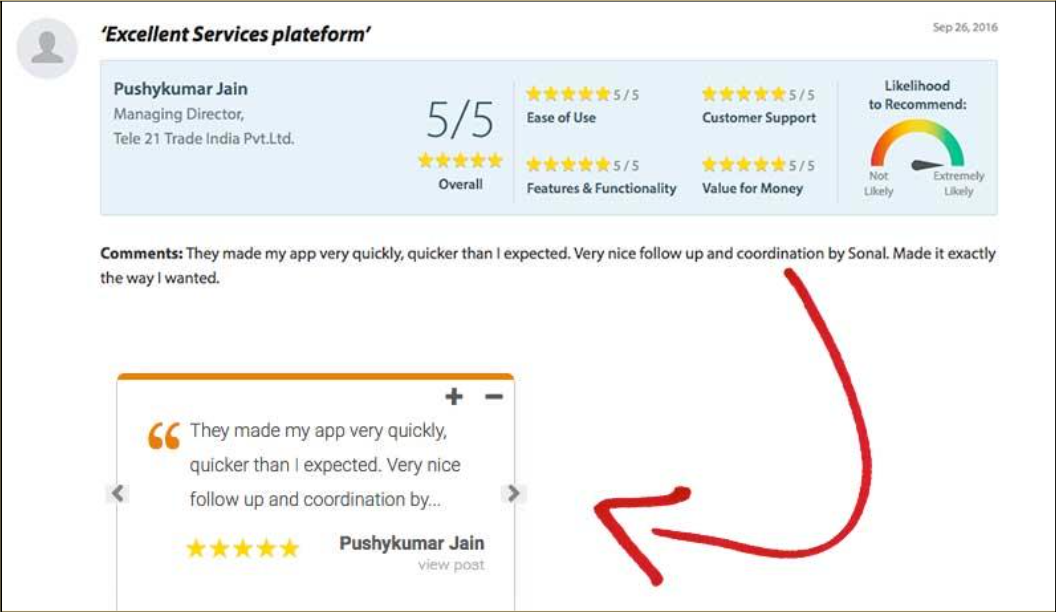
8. Content syndication
Content syndication is when third-party websites take the exact copy of a piece of content and republish it on their platform with credits going to the original piece. It’s worth noting that content syndication is different from content repurposing.
In content repurposing, you try to turn one format of content into another to fill a missing format gap. For example, making a video out of a blog post. While in content syndication the format remains the same. For example, re-publishing a blog post exactly as it is on a different website.
Here’s an example. In the screenshot below you can see inbound.org having published an exact blog post from shoutmeloud.com:
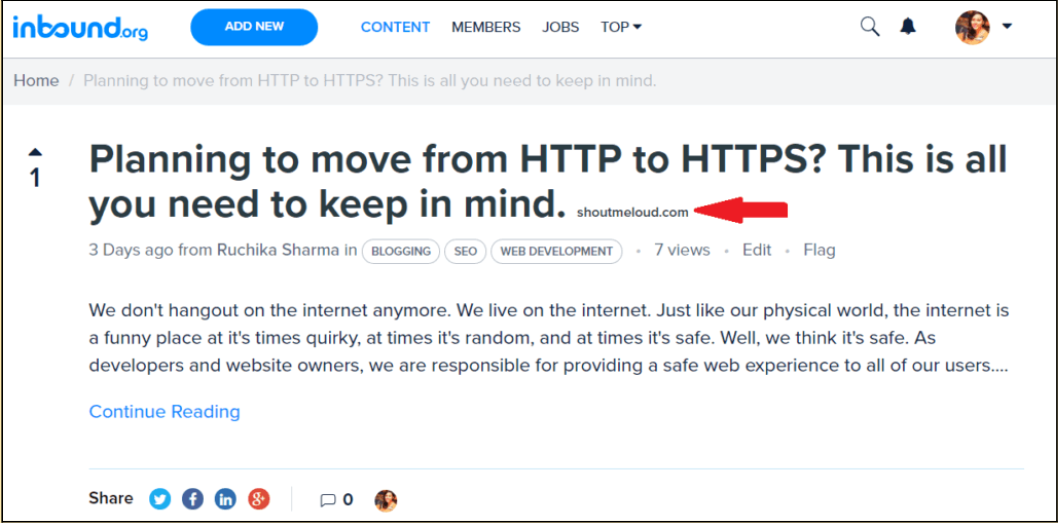
Using content syndication for off-page SEO promotion is simple:
- You create great original and unique value-driving content on your website.
- You either let the post attract enough eyeballs or your outreach to people (industrial magazines, influencers, etc.) to offer your post to be re-published on their platform.
- You get the content re-published with a link to the original post coming to your website.
This technique would not only bring you link-building opportunities but also potentially referral traffic as well.
One point to note is that to win with content syndication your content’s quality needs to be absolutely killer. Big websites are generally not open to re-publishing existing content on their platform unless they believe the content is highly valuable for their own audience.
Off-page SEO examples: Case studies to learn from
Here are a few case studies to see how off-page SEO campaigns look in action.
1. How Linkbuilder drove 5329% organic search growth to PDFSimpli.com
You’ve read it right, the percentage number is really that big. Linkbuilder.io is a link-building agency that provides high-end link-building solutions to ambitious companies. This project was that of a SaaS company belonging to file conversion technology.
The space PDFSimpli operated in was highly competitive and there were dozens of other similar products trying to rank for similar keywords as them. Therefore, they invested in link-building to out-rank them all.
The agency started with a deep competitor analysis to investigate the following aspects;
- What types of pages are their competitors generating links from?
- What is the contextual background of the topics they’ve generated a link from?
- What does the ratio of anchor text diversification look like?
At the start, they built authority by pointing links towards the homepage of the website for a site-wide distribution of PageRank. And later on, they started focusing on targeted landing pages as well.
Overtime their link profile continued to grow:
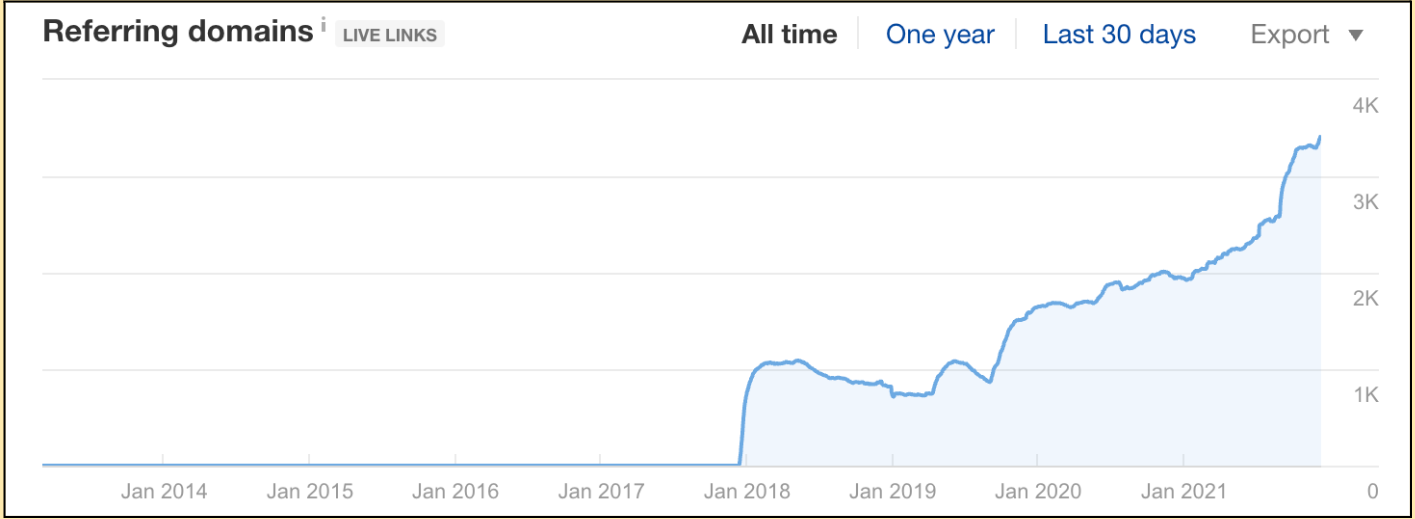
This allowed Linkbuilder.io to pull these big numbers for PDFSimpli.com in 24 months:
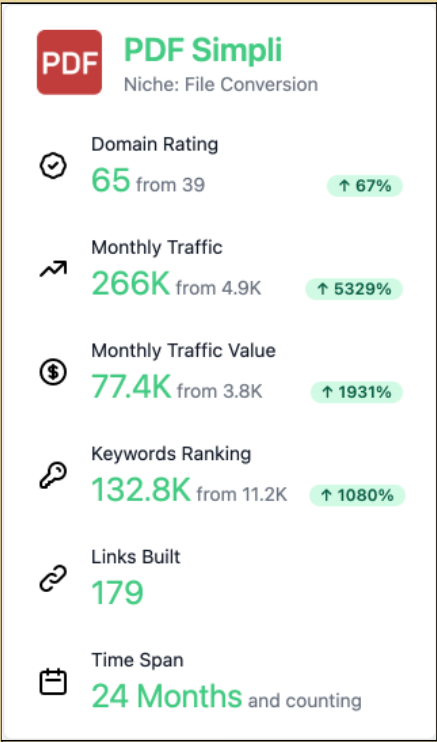
2. How Ahrefs built 2600+ Backlinks to a single statistics page
A while back Ahrefs ran a test to see if they can build backlinks with pure outreach to a totally new page. What they wanted to show essentially was that email outreach works for link-building if you have great content to offer value with and are conscious of who you reach out to.
They first had to pick a topic that’s potentially link-driving once pitched to someone. Using their own keyword research tool they picked the topic ‘SEO Statistics’ mainly because they noticed statistic pages have a lot of backlinks.
For example, here is the SERP for the keyword “YouTube Statistics” and you can notice the number of domains that are linking to each:
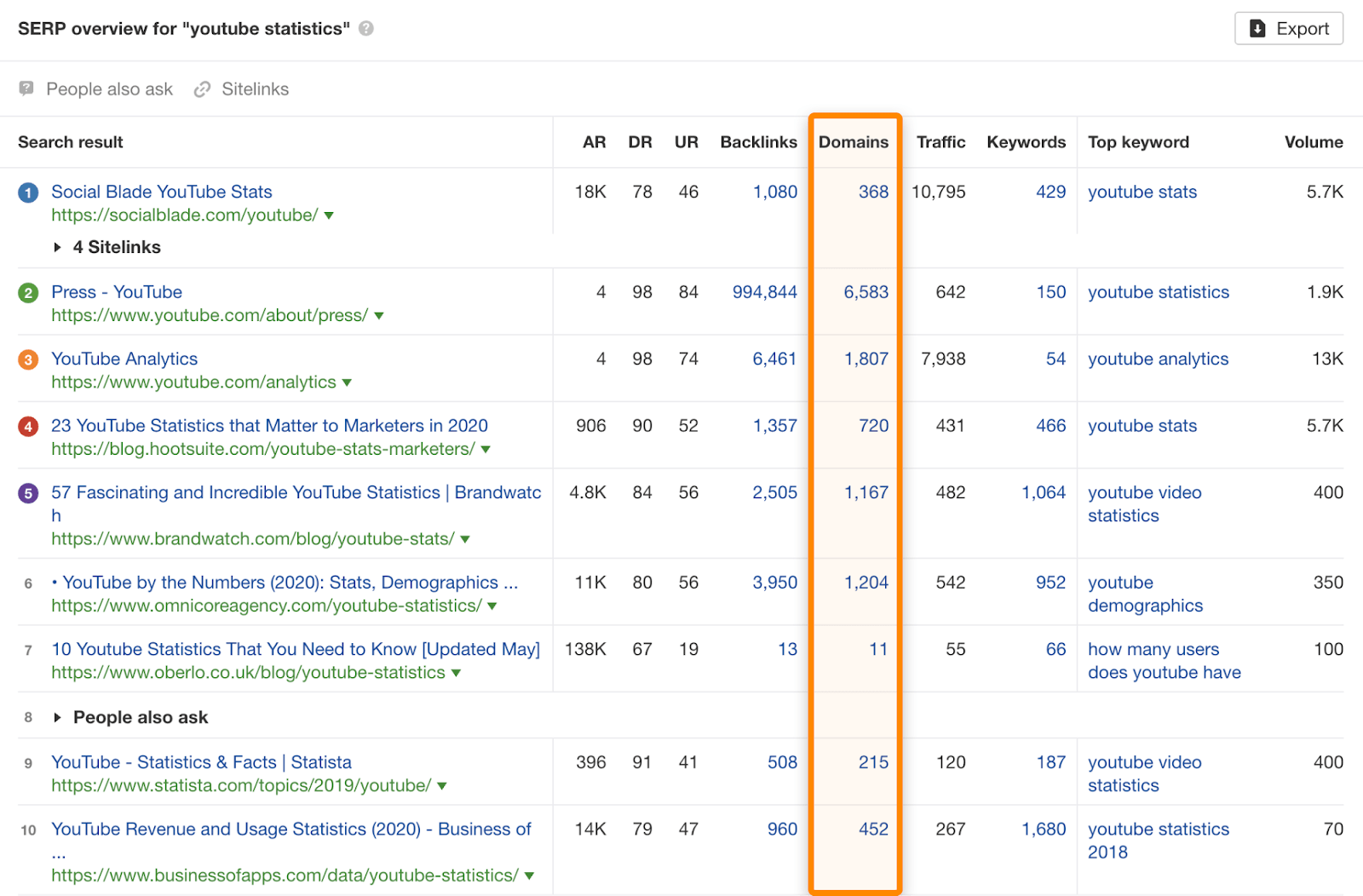
Therefore, Ahrefs created a killer post that included a total of 63 SEO Statistics, more than any other post that was already in the SERP. This is what the page looked like:
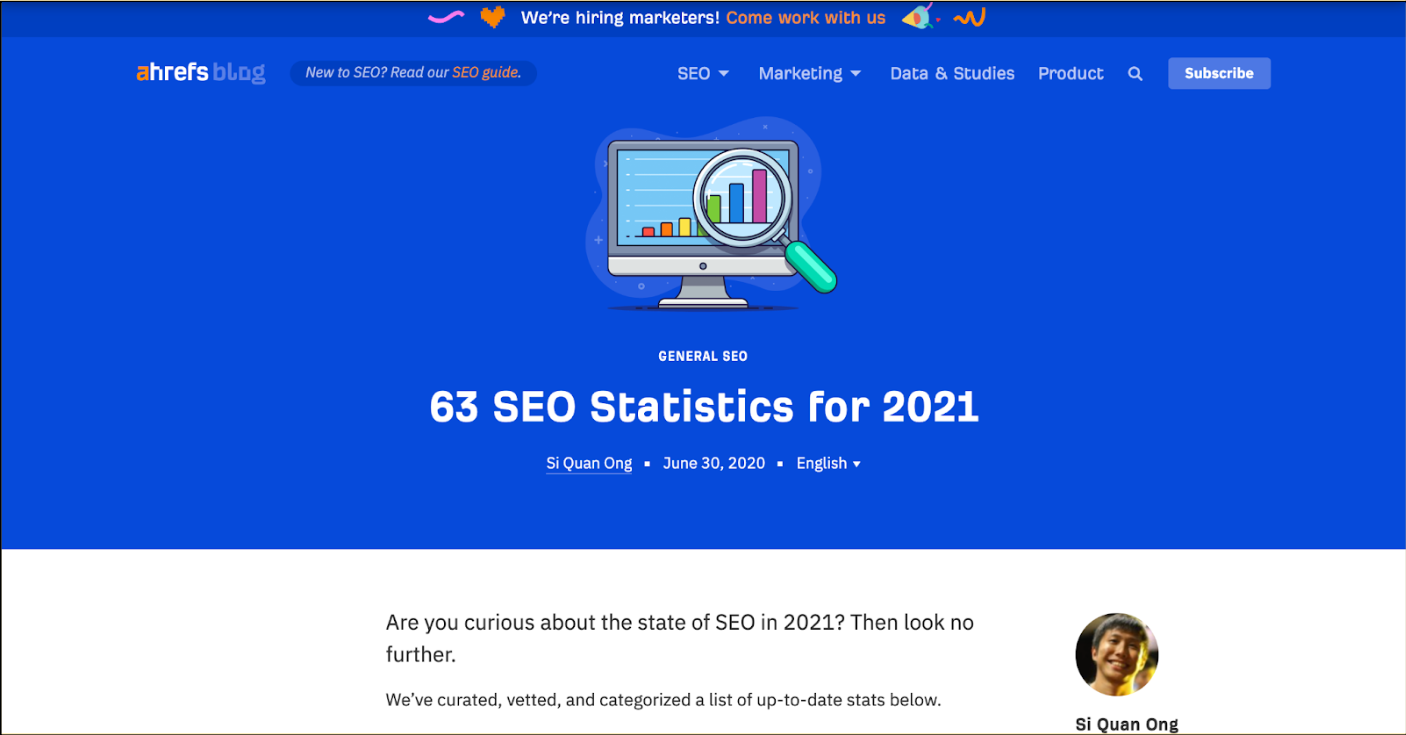
Onwards, here’s a recap of what they did:
- Curated a list of websites to outreach to (mostly based on the websites that were linking to other “SEO statistics” articles since those stats were outdated)
- Found the contact information of their prospects with a couple of scraping tool’s API (since they wanted to conduct it on a bigger scale and efficiently)
- And finally they wrote a personalized outreach email template and used it to send emails to all the prospects.
The results? Ahrefs achieved an outreach-to-link-acquisition percentage of 5.71%. They sent 515 emails out of which 27 websites linked back to their statistics page.
What’s even amazing is that initially they just gathered these 27 links with their outreach however once they ranked 1st in Google for the keyword “SEO statistics” their backlink profile for this page was set on auto-pilot and they continued driving links passively.
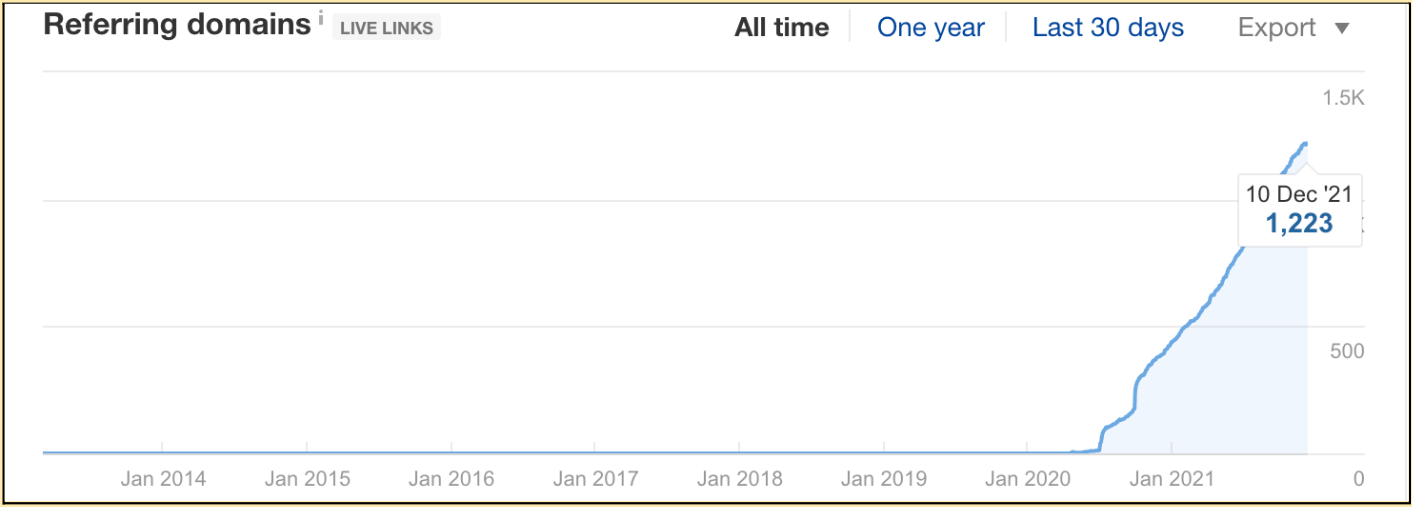
To date, this page has accumulated around 2600+ backlinks.

Key takeaways about off-page SEO
When it comes to SEO, off-page is one massive component that cannot be left unfilled for an SEO campaign to fully perform. Strong link-building strategies would not just help your backlink profile get stronger but will also mark your website as a trusted and credible source on the internet for both search engines and the users.
Although there are other ways to win with SEO if your website’s backlink profile is not too strong, it’s a data-supported fact that having a powerful domain authority would bring you results much easier than otherwise. Therefore, any time or resources invested in off-page SEO is totally worth it.
Here’s a recap of everything you need to know about off-page SEO:
- Off-page SEO is a crucial aspect of a holistic SEO growth strategy
- A major chunk of off-page SEO includes, but is not limited to, backlinks.
- Backlinks work as a voting system, presenting your website as a credible source of information.
- Not all links are valued equally by search engines like Google: a variety of signals play a role.
- Off-page is any kind of off-site promotion for your website: reviews, forums, social media, etc.
We created a guide to interviewing customers for content that resonates with them
CREATE CONTENT FOR GROWTH
Frequently asked questions about off-page SEO
What is the difference between on-page SEO and off-page SEO?
On-page SEO is all the actions that you take while you’re on the website. These include title tag, slug optimization, meta description, heading tags, internal links, and external links. On the other hand, off-page SEO is a set of actions you take outside your website to improve search engine rankings. For example, building links, social media promotion, etc.
How can off-page SEO be improved?
Off-page SEO can be improved by paying close attention to your competitors and seeing what works for them. There are practices off-page which might be effective for certain industries but might not work for others. For example, aggregator websites often give free award badges which when added to a webpage gives them a link back to their website. That’s a practice only aggregator websites have been able to use and might not work for a generic B2C company.
What are the benefits of off-page SEO?
There are multiple benefits of off-page SEO and they go way beyond just search rankings. Off-page SEO surely helps in ranking higher in search engines, but they also help drive referral traffic, develop trust for the visitors and make your website easily crawlable and indexable for search engines.
